Thanks to all who expressed appreciation for last week’s big Best of… list. We are truly grateful for your encouragement. Thanks even more to those who sent us orders. You all keep us going. (Although let’s not fool ourselves; this business can’t survive on accolades alone.) So, fight the social trends and resist the cultural tendencies: read, read, read! Buy books and give them away. Stack them around. Spend less on other stuff and invest in interesting books. Be curious. (Use your library!) As Karen Swallow Prior says, reveling in an older usage, read promiscuously. Move beyond the predictability of safe Christian book lists or popular best-seller fare. Be surprised; take risks; dare greatly in your book buying. Have fun subverting the spiffy ease of digital everything. Don’t you want to be the kind of person that does that, that kind of reader, that kind of book buyer?
We think we can help.
Here are some more titles we really enjoyed this Year of our Lord that deserve special acclaim. Add this to our previous list of favorites for 2018.
We suspect some of these titles we are about to celebrate are not for everyone, but after last week’s honoring of truly significant works, we wanted to highlight more. Some of these are doubtlessly deserving of highly significant honors, others we were itching to name because one of us was wowed by reading them or we got a kick out of telling folks about them. These are some that we have to name as we look back in our year in review. Congrats to one and all.
BEST BOOKS ABOUT BOOKS, READING, and WRITING
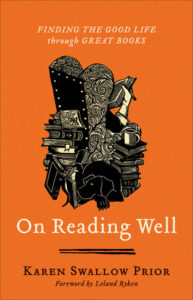 On Reading Well: Finding the Good Life Through Great Books Karen Swallow Prior (Brazos Press) $19.99 I certainly hope you didn’t miss the hullabaloo about this wonderful work this fall. We celebrated it because (a) we love Karen and her other work, such as Booked: Literature in the Soul of Me and her biography called Fierce Convictions: The Extraordinary Life of Hannah More — Poet, Reformer, Abolitionist and (b) because this book is about the value and virtues of reading classic and higher quality literature, and (b) because our good friend from Square Halo Books and World’s End Images, Ned Bustard, did artwork for each chapter. That this book got so much publicity on-line, in newspapers and podcasts and (yes!) here at the shop where we had a wonderful evening hosting her speaking about her passion for books and reading from On Reading Well, is just further indication that this is an important work that resonated with many. Blurbs on the back are from diverse authors such as Jonathan Merritt (who says “her book on books is her best yet… a love letter to literature.), Tish Harrison Warren (who says it is “an exploration of the formative power of stories and an excavation of the life well lived.”), and Russell Moore who says On Reading Well is for those who may at first think reading about reading is for them. He continues, “A significant and powerful work that will refocus discussion on the meaning of reading for spiritual formation.”
On Reading Well: Finding the Good Life Through Great Books Karen Swallow Prior (Brazos Press) $19.99 I certainly hope you didn’t miss the hullabaloo about this wonderful work this fall. We celebrated it because (a) we love Karen and her other work, such as Booked: Literature in the Soul of Me and her biography called Fierce Convictions: The Extraordinary Life of Hannah More — Poet, Reformer, Abolitionist and (b) because this book is about the value and virtues of reading classic and higher quality literature, and (b) because our good friend from Square Halo Books and World’s End Images, Ned Bustard, did artwork for each chapter. That this book got so much publicity on-line, in newspapers and podcasts and (yes!) here at the shop where we had a wonderful evening hosting her speaking about her passion for books and reading from On Reading Well, is just further indication that this is an important work that resonated with many. Blurbs on the back are from diverse authors such as Jonathan Merritt (who says “her book on books is her best yet… a love letter to literature.), Tish Harrison Warren (who says it is “an exploration of the formative power of stories and an excavation of the life well lived.”), and Russell Moore who says On Reading Well is for those who may at first think reading about reading is for them. He continues, “A significant and powerful work that will refocus discussion on the meaning of reading for spiritual formation.”
I enjoyed writing a long review of it at BookNotes and concur with Tish Warren, who writes,
This story-saturated engagement with the virtues is pragmatic enough to touch the nitty-gritty of our lives and imaginative enough to inspire.
We are not the only ones to determine to honor and celebrate Karen Swallow Prior and her book On Reading Well as one of the best books of 2018. It was happily on a number of critics and periodicals end of the year lists and has garnered a number of impressive awards. Now is gets a coveted — haha — Hearts & Minds Best Book award as well. Cheers!
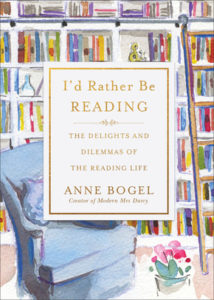 I’d Rather Be Reading: The Delights and Dilemmas of the Reading Life Anne Bogel (Baker Books) $14.99 Oh my, we wish we could just give these out to anyone and everyone — it is a book lover’s joy to see a handsome little book offering all kinds of insights about the lifestyle of being a serious reader. Yet, even though it (not unlike Prior, but perhaps with a bit more whimsy) understands and helps explains the significance and implications of the reading life, it also holds up the joy and quirky (charming and sometimes odd) habits that those of us who love books exhibit.
I’d Rather Be Reading: The Delights and Dilemmas of the Reading Life Anne Bogel (Baker Books) $14.99 Oh my, we wish we could just give these out to anyone and everyone — it is a book lover’s joy to see a handsome little book offering all kinds of insights about the lifestyle of being a serious reader. Yet, even though it (not unlike Prior, but perhaps with a bit more whimsy) understands and helps explains the significance and implications of the reading life, it also holds up the joy and quirky (charming and sometimes odd) habits that those of us who love books exhibit.
Anne Bogel, as we explained in our review earlier, is the creator of the popular blog Modern Mrs. Darcey and the podcast What Should I Read Next. I suppose this may be aimed at female readers, mostly, but I loved it. Beth and I (and our staff) so appreciate a little volume that declares to the world what we are about and is unashamed to admit that many of have this hobby that is more than a hobby but nearly a beautiful obsession. Anybody who loves reading and cares about their bookish habits will enjoy this and I know many have purchased it as a little gift for their book-loving friends. More importantly, perhaps, it might introduce the charms and benefits of reading to those yet to be seduced. Let us hope this good guide makes it way to many.
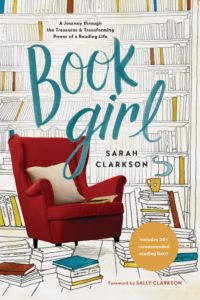 Book Girl: A Journey Through the Treasures and Transforming Power of a Reading Life Sarah Clarkson (Tyndale Momentum) $15.99 There is no doubt this is one of my favorite books of 2018 and one we will continue to tell others about for a long time to come. In my too-brief review last fall I considered, but did not, use a Goldilocks analogue, but I shall now. If Swallow Prior’s On Reading Well is tooo tough and long and Anne Bogel’s I’d Rather Be Reading is tooo short and sweet, well, Book Girl is “just right!” Indeed, Clarkson is as smart and charming and fun and practical and wise (and well-read!) as both of the above mentioned authors and their books combined. I adored this very, very thoughtful reminder of what books can do for us, the profound ways they shape our worldview, the way they can create empathy and help us navigate our world. It is a wonder no one has written a book quite like this (although, I must say, it is stuff I’ve said often in workshops and lectures.)
Book Girl: A Journey Through the Treasures and Transforming Power of a Reading Life Sarah Clarkson (Tyndale Momentum) $15.99 There is no doubt this is one of my favorite books of 2018 and one we will continue to tell others about for a long time to come. In my too-brief review last fall I considered, but did not, use a Goldilocks analogue, but I shall now. If Swallow Prior’s On Reading Well is tooo tough and long and Anne Bogel’s I’d Rather Be Reading is tooo short and sweet, well, Book Girl is “just right!” Indeed, Clarkson is as smart and charming and fun and practical and wise (and well-read!) as both of the above mentioned authors and their books combined. I adored this very, very thoughtful reminder of what books can do for us, the profound ways they shape our worldview, the way they can create empathy and help us navigate our world. It is a wonder no one has written a book quite like this (although, I must say, it is stuff I’ve said often in workshops and lectures.)
Not only did Book Girl make a convincing case about the value of the reading life and explain how books nurture both the life of the mind and the calibre of the heart, it also is loaded with book lists, recommended readings, annotated inventories of titles for this or that topic. Highly recommended.
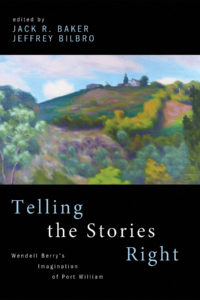 Telling the Stories Right: Wendell Berry’s Imagination of Port William edited by Jack R. Baker & Jeffrey Bilbro (Front Porch Republic Books) $27.00 There are so many books that fall into the “literary criticism” and “books about books” category and we appreciate many. For instance, who wouldn’t find intriguing a 2018 book called Haunted by Christ: Modern Writers and the Struggle for Faith (by Richard Harris; SPCK; $27.00) or the fabulous new book from Plough Publishing called The Gospel in Dorothy Sayers (compiled by Carole Vanderhoof; $18.00.) One of the good ones that we actually sold a handful of was by the great Sarah Arthur called A Light So Lovely:The Spiritual Legacy of Madeleine L’Engle; Zondervan; $19.99.) There are so many books like this and we are glad.
Telling the Stories Right: Wendell Berry’s Imagination of Port William edited by Jack R. Baker & Jeffrey Bilbro (Front Porch Republic Books) $27.00 There are so many books that fall into the “literary criticism” and “books about books” category and we appreciate many. For instance, who wouldn’t find intriguing a 2018 book called Haunted by Christ: Modern Writers and the Struggle for Faith (by Richard Harris; SPCK; $27.00) or the fabulous new book from Plough Publishing called The Gospel in Dorothy Sayers (compiled by Carole Vanderhoof; $18.00.) One of the good ones that we actually sold a handful of was by the great Sarah Arthur called A Light So Lovely:The Spiritual Legacy of Madeleine L’Engle; Zondervan; $19.99.) There are so many books like this and we are glad.
But Baker & Bilbro have given us something truly remarkable and I am thrilled to tell you about it. Telling the Stories Right, as the subtitle suggests, is a collection of essays about the fictional world Wendell Berry has created, the legendary Port William of Kentucky. Berry is known as an essayist and agrarian reformer. He is a farmer, a poet, an environmental activist, and is well known for essays about rural life, farmer — the good and the bad — and about being attentive to place, to land, to creation. For instance, 2017 saw a fabulous hardback collection of recent agrarian essays (The Art of Loading Brush) but 2018 saw the release of the first volume of the handsome Library of America ‘s (what will be) complete collection of Berry’s fiction, in (fictional) chronological order. In this volume, all of his novels and short stories are placed in the proper order (not when they were written, but when the story takes place) starting somewhat after the Civil War. The prestigious Library of America will do a second volume two collected fictional works maybe next year…
This Front Porch Republic book by Baker & Bilbro offers a look at many facets of Berry’s fiction, his rendering of the small Kentucky town and it’s fields and characters and ethos. There are twelve chapters here and as it says on the back, they “approach Berry’s fiction from a variety of perspectives — literary studies, journalism, theology, history, songwriting — to shed light on its remarkable ability to make a good life imaginable and compelling. This volume is not the first to study his fiction but it is the best, insisting that “any consideration of Berry’s work bust being with his stories.”
There are wonderful writers here, doing very interesting things. Kiara Jorgenson from St. Olaf College writes about affection and the sense of vocation in the stories. Eric Miller, a historian who teaches at Geneva College (and who lived for a spell in York, PA, near us) studies letters Wendell Berry received, about the novels, looking for clues to how readers respond to the stories. Bilbro’s own chapter is called “Andy Catlett’s Missing Hand: Making Do as Wounded Members.” Jake Meador of the Davenant Institute writes on Jayber Crow; singer-songwriter and founder of Rabbit Room Andrew Peterson has a lovely, short chapter paying tribute. A few other acquaintances are here: Michael Stevens (who wrote the first book that explored Berry from a Christian viewpoint, Wendell Berry and the Cultivation of Life) has a brilliant chapter about marginal characters (and hedgerows.) Doug Sikkema writes for Comment and has a piece about the “narrative tradition” of Berry’s fiction, comparing him to Stegner, Stanford, and the Class of ’58. Yes, the women and men who offered chapters here know Berry’s work well and obviously enjoy writing about this fictional place that “makes goodness compelling.”
The next best thing to reading Berry is to read those who write about Berry’s writing. We should be extremely grateful that we now have this collection of wise investigations of Berry’s novels and short stories. These essays do what they were meant to do which is nothing less than celebrate Berry’s fertile imagination.” –Stanley Hauerwas, Professor of Divinity and Law at Duke University
“”When I encounter readers, who share Wendell Berry’s concerns but are unfamiliar with his work, I urge them to begin with his fiction. One finds there, more fully arrayed than in his essays or poetry, the web of relationships connecting persons, place, and community. The weaving of that web, on the page and in the world, is the subject of the dozen studies in this book, a worthy guide to the storytelling art of an essential author.” –Scott Sanders, author of Earth Works
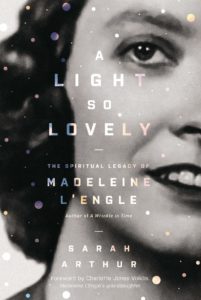 A Light So Lovely: The Spiritual Legacy of Madeleine L’Engle Sarah Arthur (Zondervan) $19.99 I do not know if you will adore this book or not. If you like L’Engle you will be glad to learn of her impact and influence on others. You may know about some of her struggles, personal and otherwise (including the loud criticisms she got from some quarters. It seems she was to open-minded and literary for some conservative religious adherents and yet too Christian for some mainstream critics. Yep.) From Phil Yancey to Luci Shaw, she inspired and befriended many thoughtful Christian writers, and her soul friends are here. Fiction writers like Jeffrey Overstreet are interviewed as are other of L’Engle’s writing colleagues.
A Light So Lovely: The Spiritual Legacy of Madeleine L’Engle Sarah Arthur (Zondervan) $19.99 I do not know if you will adore this book or not. If you like L’Engle you will be glad to learn of her impact and influence on others. You may know about some of her struggles, personal and otherwise (including the loud criticisms she got from some quarters. It seems she was to open-minded and literary for some conservative religious adherents and yet too Christian for some mainstream critics. Yep.) From Phil Yancey to Luci Shaw, she inspired and befriended many thoughtful Christian writers, and her soul friends are here. Fiction writers like Jeffrey Overstreet are interviewed as are other of L’Engle’s writing colleagues.
Her faith was profound and she had what might be called a sacramental view of reality. This book explores her view of her craft as a writer, her role as a thinker, cites her memoirs and essays and Bible studies as well as the Wrinkle in Time works. It’s thoughtful, but not heavy, but not a simple biography. It really is does explore L’Engle’s “spiritual legacy.” I liked the little “French fold” covers that make it extra nicer, not to mention a foreword by Charlotte Jones Voiklis. And you thought you like Meg Murray and Calvin O’Keefe! Thanks to Sarah Arthur for offering this lovely book.
BOOKS OF FAITH FORMATION (BUT NOT TYPICAL DEVOTIONAL/CHRISTIAN LIVING WRITING)
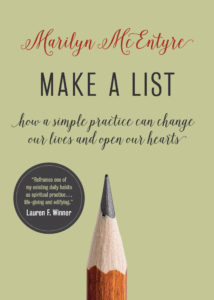 Make a List: How a Simple Practice Can Change Our Lives and Open Our Hearts Marilyn McEntyre (Eerdmans) $21.99 Even if I hadn’t cracked the cover of this compact, hand-sized hardback I’d have nominated for a “best cover” award, I think. I love Marilyn McEntyre, having read several of her volumes of poetry, devotion, Advent, books about grief, about dying, even one about St. Patrick. I’ve chatted with here and served on a panel once and she remains a literary hero. One of my favorite books in the last decade has become a chestnut for me, one I take everywhere and often press into people’s hands — it is called Caring for Words in a Culture of Lies. These were lectures (The Stone Lectures at Princeton, actually) riffing on the theme of words as natural resources and offering “stewardship strategies” to steward them well lest they turn toxic and pollute our common life. More recently she did a lovely and thoughtful devotional playing with words, called Word by Word: A Daily Spiritual Practice. And later this year, Eerdmans will release When Poets Pray.
Make a List: How a Simple Practice Can Change Our Lives and Open Our Hearts Marilyn McEntyre (Eerdmans) $21.99 Even if I hadn’t cracked the cover of this compact, hand-sized hardback I’d have nominated for a “best cover” award, I think. I love Marilyn McEntyre, having read several of her volumes of poetry, devotion, Advent, books about grief, about dying, even one about St. Patrick. I’ve chatted with here and served on a panel once and she remains a literary hero. One of my favorite books in the last decade has become a chestnut for me, one I take everywhere and often press into people’s hands — it is called Caring for Words in a Culture of Lies. These were lectures (The Stone Lectures at Princeton, actually) riffing on the theme of words as natural resources and offering “stewardship strategies” to steward them well lest they turn toxic and pollute our common life. More recently she did a lovely and thoughtful devotional playing with words, called Word by Word: A Daily Spiritual Practice. And later this year, Eerdmans will release When Poets Pray.
Make a List is the one we are honoring now, though; at first blush it seems less overly spiritual than most of her others. And yet, this human practice — list making — can be stewarded well, as well, and can become a spiritual discipline. In her insightful hands, a book about list-making becomes a mature and generative work. Who knew?
We could give this an award, if we were being goofy, about Make a List being one of the hardest books to know where to shelf here in the shop. Is it a self-help book? A time management tool? A resource for the absentminded, helping one become productive in a “getting things done” section of the store? Or is it, as the subtitle audaciously says, a “practice” that can “open our hearts”? Maybe we should put it under spiritual formation? As Jamie Smith says, ‘the things we do, do things to us” so, surely, this is a book about formation.
The author is treasured by many. Authors and artists and theologians such as Shauna Niequist and Michael Card and Samuel Wells all have accolades on the back of the book. Lauren Winner’s endorsement is on the front. Any new book of McEntyre’s, we think, is deserving of a very big shout out. I think I’ll make a list of all the things I like about this. Number one is that it is just so nicely written, so charming and artful and good. Cheers.
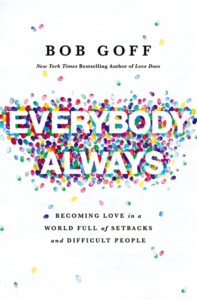 Everybody Always: Becoming Love in a World Full of Setbacks and Difficult People Bob Goff (Nelson) $16.99 This is, obviously, one of the notable books of 2018. Bob is a funny, funny, guy, but behind the exuberance and whimsy and connecting everybody and encouraging others is a sly, whimsical, but sly strategy. Bob is inviting people to live a better story, a story connected to the big themes of the Kingdom of God, the joys (and sacrifices) of following Jesus. He knows the gospels and he has spent much of his life serving God, helping others, building a famously creative and adventurous family — not to mention an avocation of fighting sexual trafficking, starting orphanages in war zones, schools in rural Africa, and coming alongside folks as diverse as hipster cum business consultant Donald Miller to thoughtful global activist and history writer Jay Milbrandt or fun and fiery spiritual renewal leader Bianca Juarez Olthoff. He gets around and knows folks all over — just read the wonderful forward to, for instance, the brand new Salvaged: Leadership Lessons Pulled from the Junkyard by his childhood friend, Roy Goble or learn how he continues to serve folks in Somalia or Uganda. What his Dream Big video promos and pick up the wholesome, energetic, encouragement.
Everybody Always: Becoming Love in a World Full of Setbacks and Difficult People Bob Goff (Nelson) $16.99 This is, obviously, one of the notable books of 2018. Bob is a funny, funny, guy, but behind the exuberance and whimsy and connecting everybody and encouraging others is a sly, whimsical, but sly strategy. Bob is inviting people to live a better story, a story connected to the big themes of the Kingdom of God, the joys (and sacrifices) of following Jesus. He knows the gospels and he has spent much of his life serving God, helping others, building a famously creative and adventurous family — not to mention an avocation of fighting sexual trafficking, starting orphanages in war zones, schools in rural Africa, and coming alongside folks as diverse as hipster cum business consultant Donald Miller to thoughtful global activist and history writer Jay Milbrandt or fun and fiery spiritual renewal leader Bianca Juarez Olthoff. He gets around and knows folks all over — just read the wonderful forward to, for instance, the brand new Salvaged: Leadership Lessons Pulled from the Junkyard by his childhood friend, Roy Goble or learn how he continues to serve folks in Somalia or Uganda. What his Dream Big video promos and pick up the wholesome, energetic, encouragement.
Anyway, like his much-loved Love Does this 2018 release is inspiring, funny, dramatic, well-told, audacious, and yet, oddly, down to Earth. Some have told us they think some of the stories are more powerful than Love Does. I think that may be the case….I couldn’t put it down, but what do you expect.
We carry the DVD, too. Top notch, sure to please almost any teen or adult ed class or small group. Not terribly intense doctrinal study, but if you, like Bob, want to “love everyone, always” but being involved in “Bible doings” not just “Bible studies”, he’s your man.
If you want to “Dream Big” as he puts it, he’s really your man.
Here is how the publisher describes Everybody Always:
Driven by Bob’s trademark storytelling, Everybody, Always reveals the lessons Bob learned–often the hard way–about what it means to love without inhibition, insecurity, or restriction. From finding the right friends to discovering the upside of failure, Everybody, Always points the way to embodying love by doing the unexpected, the intimidating, the seemingly impossible. Whether losing his shoes while skydiving solo or befriending a Ugandan witch doctor, Bob steps into life with a no-limits embrace of others that is as infectious as it is extraordinarily ordinary. Everybody, Always reveals how we can do the same.
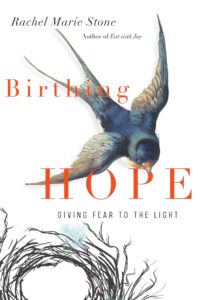 Birthing Hope: Giving Fear to the Light Rachel Marie Stone (IVP) $16.00 This is a book that just took my breath away at times, very well written and very well thought out and very touching, tender, even. Rachel tells illuminating stories that hold her life up to the light — and allows us to join her and do the same — and see where fear and loss and pain has shaped her and how hope has broken through. Amy Julia Becker (herself a very talented writer) says “Birthing Hope drew me in from the first page to the last…”
Birthing Hope: Giving Fear to the Light Rachel Marie Stone (IVP) $16.00 This is a book that just took my breath away at times, very well written and very well thought out and very touching, tender, even. Rachel tells illuminating stories that hold her life up to the light — and allows us to join her and do the same — and see where fear and loss and pain has shaped her and how hope has broken through. Amy Julia Becker (herself a very talented writer) says “Birthing Hope drew me in from the first page to the last…”
Two scenes early in the book are indicative: there’s a story about her fearing water as she her dad helps her learn to swim. It is so well told and so realistic that I felt it. More extraordinary, perhaps, was a riveting story about a risky procedure in a birthing clinic in a part of Africa plagued by HIV and AIDS. Why are we sometimes brave, why do we take risks why do we sometimes not? Where is God amidst our human fears and foibles?
Rachel Marie Stone wrote a very good, basic, clear, theologically-wise book on food called Eat with Joy that is unparalleled as an accessible good study. As in that one, but more-so, Birthing Hope offers a robust, down-to-Earth creational theology, and, in this case, uses the good metaphor of birth as a way into the conversation (by way of writing about family and motherhood and physicality and anxiety and more) about birthing hope.
There are so many good endorsements of this book and since I am telling you why we name it as one of our favorite books of 2018, allow me to share what others have said, who say it more eloquently than I; do read this — they are eloquent and compelling.
“I love this book. You needn’t have given birth to love it. Maybe you don’t even have to be curious about God or life as a human being to love it―the prose is that strong and compelling that perhaps even the God-and-human-uncurious might love it. My copy is going on my read-once-a-year shelf, after Jane Smiley and before Robert Penn Warren.” (Lauren F. Winner, associate professor at Duke Divinity School, author of Wearing God)
“Ask me what this book is about and I will struggle to give you a simple answer. It is about pregnancy and birth, anxiety and despair, blood and water. It is memoir and history, poetry and theology. Ask me, though, why you should read this book, and my answer is very simple―because you are a person with a body in and through which you bear pain, fear, and failure. Read this book for its necessary wisdom. In our most desperate vulnerability, when all we can do is endure, God is there too.” (Ellen Painter Dollar, author of No Easy Choice: A Story of Disability, Parenthood, and Faith in an Age of Advanced Reproduction)
“Birthing Hope drew me in from the first page to the last. Rachel Marie Stone’s masterful interweaving of family story, theological truth, and personal reflection on birth, life, and loss puts her in the company of writers such as Rebecca Solnit and Eula Biss. I will return to this book for wisdom, beautiful writing, and encouragement that, even in the face of loss and sorrow, it is good to give ourselves to the light.” (Amy Julia Becker, author of Small Talk and A Good and Perfect Gift and White Picket Fences.)
“We all carry fear with us in our bodies. Some of us try to escape it, some excel at denying it, and others attempt to bully it into submission. Rachel Marie Stone’s shimmering writing instead invites readers to recognize the ways in which fear shapes us (and sometimes breaks us) as human beings. Birthing Hope reveals, with honesty and grace, the ways in which holy, embodied hope can re-form our response to fear.” (Michelle Van Loon, author of Moments & Days: How Our Holy Celebrations Shape Our Faith)
“I’ve been waiting for a book like this one for years, and no one could have written it more beautifully and wisely than Rachel Marie Stone. With the skill of a poet and the patience of a doula, Stone invites the reader to look straight into the face of fear and find in it the spark of hope. There are words and phrases from these pages that I will go on pondering for years. Theologically rich and carefully researched, Birthing Hope is a book for everyone, but as a new mother it proved life changing―the kind of book that leaves you breathless.” (Rachel Held Evans, author of Searching for Sunday and A Year of Biblical Womanhood and Inspired.)
“Profound theology, deep psychic insight, and the kind of wisdom that only emerges from immersion in life and the Scriptures―Rachel Marie Stone’s book is a treasure, unforgettable, entirely compelling.” (James Howell, author of Worshipful: Living Sunday Morning All Week)
“Why do so many movies and TV shows portray birth so laughably poorly? It’s as if we’ve all agreed the real thing―the most elemental human reality―is too raw and inelegant, too terrible and ecstatic, to be honest about. Rachel Marie Stone upends this conspiracy in this feisty, smart, theologically illuminating book. In her hands, birth is not only a sacrament of solidarity, a sign of hope amid the chaos of doubt and fright, but also a reminder that, for all our talk of immortal souls, we have and are bodies, fearfully and wonderfully so.” (Wesley Hill, author of Spiritual Friendship: Finding Love in the Church as a Celibate Gay Christian)
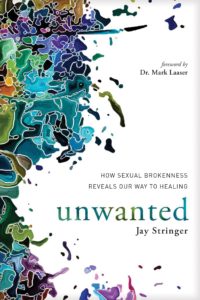 Unwanted: How Sexual Brokenness Reveals Our Way to Healing Jay Stringer (NavPress) $16.99 I thought of listing this in our last list of Best Books of 2018 but I felt like that list was getting long and a bit heavy. The topic of this is heavy, but I wanted to name it in this second list of perhaps more fun and fresh writing. This is not your typical study of lust and purity or closing the window on porn use. It is about finding God’s grace to be transformed, in slow and deep ways, that allow us to find healing from unwanted sins and hard temptations, and it is brutal to read in some ways. But yet, unlike any other book of this kind, it offers a remarkable approach. As String puts in in a slogan perfect for this age of hashtags: listen to your lust.
Unwanted: How Sexual Brokenness Reveals Our Way to Healing Jay Stringer (NavPress) $16.99 I thought of listing this in our last list of Best Books of 2018 but I felt like that list was getting long and a bit heavy. The topic of this is heavy, but I wanted to name it in this second list of perhaps more fun and fresh writing. This is not your typical study of lust and purity or closing the window on porn use. It is about finding God’s grace to be transformed, in slow and deep ways, that allow us to find healing from unwanted sins and hard temptations, and it is brutal to read in some ways. But yet, unlike any other book of this kind, it offers a remarkable approach. As String puts in in a slogan perfect for this age of hashtags: listen to your lust.
As we explained before this book came out, we knew of Stringer and his family decades ago, and I’ve come to respect him immensely as we studious and Biblically-informed scholar of psychiatric care. His most important qualification, in my book, besides his being a kind and faithful counselor who is attentive to the Word and attentive to the world, is that he studied with Dan Allender at the Seattle School of Theology.
Dan Allender does not write too many blurbs on too many books, but he says this of Unwanted:
“Without rival, the best book on broken sexuality I have ever read.”
Another key writer on books about sex addictions is Mark Laaser. Laaser wrote the foreword, which is a huge sign that this book is making an important contribution to this field. It is certainly deserving of the accolades and good reviews it has gotten.
Another thing that makes Unwanted a book worthy of acclaim is that it draws on what seems to be the largest survey yet of those who experience some kind of unwanted sexual behavior. And from this data comes a whole lot of anguish and a pattern that emerges: putting a “tourniquet” on these problems, just saying no, getting an accountability partner or safe software doesn’t work. A deeper evaluation is needed, and that is where this book comes in, inviting us to delve more deeply into the backstories of our lives, to reflect on our desires, to re-orient our loves, to seek a reformation of character by healing the hurts that have shaped our desires. He talks about “reenactment” indicating that our current brokenness may be re-playing some deeper hurts and unfulfilled longings.
This isn’t weird or even that unusual. A biblical view of the person affirms that our past plagues us and that we all are hooked into false realities — idols the Bible calls them — and until we let go of those bad stories and wrong idols and defective imaginations, we will never be fully free. Listening to what’s going on deep inside is good advise for anyone seeking spiritual growth and is common sense counsel from any advisor. In the hands of Jay Stringer it becomes a healing balm for many and Unwanted is one of the rare books in faith-based psychology that dares to speak this kind of grace-filled, hard truth. I suspect it is too deeply spiritual for some secular or humanistic counselors and I suspect it is too raw and real for some pious Christian counselors. Read it for yourself and I am sure you will see that it is certainly one of the more interesting books in many year. Kudos.
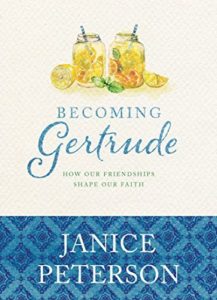 Becoming Gertrude: How Our Friendships Shape Our Faith Janice Peterson (NavPress) $14.99 Decades ago, Eugene Peterson and I stood in the hallway of a local church, and then slowly strolled out to the parking lot where we chatted a bit and dreamed about him doing a poetry reading at our store. (We had heard he sent out original poems as Christmas gifts to his mailing list of fiends and family, and I knew he might want to read for us some Gerard Manley Hopkins, say. His own poetry volume came out many years later entitled Holy Luck.) Even then, before The Message, Peterson was famous and I was reluctant to invite such a serious thinker to our small bookshop. We couldn’t pay him and we didn’t know how to proceed — we were young and idealistic but didn’t want to be rude. He was hospitable with us, friendly and willing. It never worked out, but I stopped in, later, unannounced (making a delivery, if I recall) to the apartment he and his wife, Jan, shared in Pittsburgh for a year, having left Maryland and before the call to Regent in British Columbia. Gene wasn’t there but oh did I enjoy chatting with Jan. It was a short visit and (I’m not just saying this) she was as gracious and kind and warm as can be. Years later we crossed paths a few other times and conferences or events, and what she writes about in this book (as you’d expect from anyone in this family) is born from a life lived well. She knows how to be friendly and show God’s hospitality and has done so, long before it became somewhat of a trendy theological trope. Becoming Gertrude is about friendship and kindness, showing grace and attending to others being a servant, “pouring into” others, as a younger generation puts it nowadays. In Janice’s younger days, it was as simple as being asked up on the porch for a glass of lemonade by a woman named Gertrude.
Becoming Gertrude: How Our Friendships Shape Our Faith Janice Peterson (NavPress) $14.99 Decades ago, Eugene Peterson and I stood in the hallway of a local church, and then slowly strolled out to the parking lot where we chatted a bit and dreamed about him doing a poetry reading at our store. (We had heard he sent out original poems as Christmas gifts to his mailing list of fiends and family, and I knew he might want to read for us some Gerard Manley Hopkins, say. His own poetry volume came out many years later entitled Holy Luck.) Even then, before The Message, Peterson was famous and I was reluctant to invite such a serious thinker to our small bookshop. We couldn’t pay him and we didn’t know how to proceed — we were young and idealistic but didn’t want to be rude. He was hospitable with us, friendly and willing. It never worked out, but I stopped in, later, unannounced (making a delivery, if I recall) to the apartment he and his wife, Jan, shared in Pittsburgh for a year, having left Maryland and before the call to Regent in British Columbia. Gene wasn’t there but oh did I enjoy chatting with Jan. It was a short visit and (I’m not just saying this) she was as gracious and kind and warm as can be. Years later we crossed paths a few other times and conferences or events, and what she writes about in this book (as you’d expect from anyone in this family) is born from a life lived well. She knows how to be friendly and show God’s hospitality and has done so, long before it became somewhat of a trendy theological trope. Becoming Gertrude is about friendship and kindness, showing grace and attending to others being a servant, “pouring into” others, as a younger generation puts it nowadays. In Janice’s younger days, it was as simple as being asked up on the porch for a glass of lemonade by a woman named Gertrude.
Can we all become Gertrude’s to others? This small sized, handsome book of story and guidance is, for all it’s aw-shucks, elderly wisdom, this teaching is more radical and counter-cultural and full of subversive, Kingdom implications than the lovely homespun cover suggests. To say no to busy-ness and be open to interruptions, to say no to “investing” and pragmatics and be present and real, to offer friendships in earnest which opens us up not only to love but to be loved, is not the way of the world, or even the way of the church, too often, these days.
Jan Peterson tells of the bonds of friendship that she has encountered and opens up her own storied life (yes, with some stuff about being married to Gene) but also examines five elements of relationships that can be appreciated and explored in the rhythms of ordinary life. She offers us insight about caring, acceptance, service, hospitality, and the ministry of encouragement. We ourselves can flourish as we offer these gifts to others.
Peterson offers a lot of good reminders about all this — we can get hurt, giving our lives to others with abandon; we should care about simple and good nutrition when sharing food with others, we have to accept our own selves as we practice accepting others.
She writes good words such as these:
When I offer hospitality, something amazing happens — so much more than I have anything to do with. An exchange takes place. Our guests bring who they are with them and enlarge our lives in their offerings. When we offer guests space, a lot of creative growth occurs.
When we announced this a BookNotes earlier in the fall we noted that it had reflection questions that would make Becoming Gertrude a very nice and useful book to read together with others. We honor it as a quiet little guide about friendships and mentoring and much, much more.
Becoming Gertrude: How Our Friendships Shape Our Faith byJanice Peterson released and was in her hands a few weeks before her beloved friend, husband, and partner in ministry died. I am sure Gene was very proud of her and I’m sure all were glad about this bittersweet moment when the book arrived. Now it is available in stores and for sale, and we hope it becomes well known. It might help you become Gertrude, and maybe even become Janice for others.
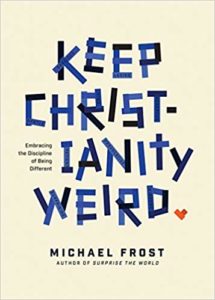 Keep Christianity Weird: Embracing the Discipline of Being Different Michael Frost (NavPress) $7.99 I should have named this in our last post, but was sort of afraid it might seem weird to celebrate an inexpensive, pocket-sized paperback as a major, enduring book of the year. But, hey-o, let’s keep it a little weird and list this goofball of a book as an award winning, super-important, major release.
Keep Christianity Weird: Embracing the Discipline of Being Different Michael Frost (NavPress) $7.99 I should have named this in our last post, but was sort of afraid it might seem weird to celebrate an inexpensive, pocket-sized paperback as a major, enduring book of the year. But, hey-o, let’s keep it a little weird and list this goofball of a book as an award winning, super-important, major release.
For starters, it is not goofy. The “Keep Austin Weird” movement is catching and, like evangelical trend-spotters before him — Tom Sine, decades ago, and Leonard Sweet, just to name two — Frost is naming a cultural moment about which the church should be aware. Give the Aussie a medal, for God’s sake, because this is very, very observant stuff that no one else has named yet. Yep, this is a ground-breaking little bit of analysis, and he’s right on.
Secondly, anybody who has been in small group Bible studies for long has surely heard some joke about being a “peculiar people” as 1 Peter 2 puts it. But, again, this holy call to distinctiveness, is serious, and although we have fun with it (yeah, some of us are more peculiar than others. hahaha) the churches accommodation to the culture around us, the bland and normal and bureaucratic and conformed, that does not invite anyone to be very much surprised by our faith, is surely deeply sad. Why are we so normal?
That is the question Frost examines and it is prophetic and profound. In a short, short, read, he invites us to “go and do likewise” by following an upside-down King of an upside-down Kingdom. Not since Brian Walsh’s utterly profound collection of messages in Subversive Christianity: Imaging God in a Dangerous Time have we heard this kind of call to “resist the allure of acceptability.”
Frost has written some of the best missional church stuff and some of the best missional discipleship stuff in recent decades. If his name is on it, buy it. But this little volume — an important follow up to his small Surprise the World: The Five Habits of Highly Missional People — is cheap enough and simple enough, that you could pass ’em out like pancakes. It is fun, at times funny, but mostly quite serious as he explore how the cultural creatives in our culture are themselves celebrating the unusual, the eccentric, the artful, the subversive. We need to embrace some of peculiarity if we are to reach them, but that’s only the start. We shouldn’t embrace weird to merely reach those on the cutting edge. We should embrace weird because in doing so there is something very healthy and appropriate for those called to live “non-conformed to the ways of this world.” We should trust God in ways that lead us to be adventuresome, creative, risk-taking and such.
While food trucks and hipster coffee shops and co-working places are popping up all over, malls have become ghost-towns, he reminds us. Nobody wants a McMansion any more. “Millennials have discovered kitchens,” he writes; what can we learn from the culture’s fascination with the artisanal? Who in church history can teach us about radical reformation? What keeps us from being weird? How do relate to the world that is changing, in some ways, perhaps, for the better? What sort of habits and practices and spirituality will bear the fruit of helping us “see things weirdly”? Michael Frost’s Keep Christianity Weird is asking hugely important questions and it is short enough to allow many to join the conversation. One of my favorite books of the year!
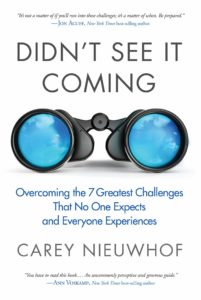 Didn’t See It Coming: Overcoming the 7 Greatest Challenges That No One Expects and Everyone Experiences Cary Nieuwhof (Waterbrook) $19.99 Although last week’s BookNotes honored some very serious books about theology and culture and spirituality and our public lives that I think are important and good, I wanted to add this to a Best of list, but wasn’t sure where to put it. It is partially an auto-biographical telling of this pastor’s own journey into burnout, somewhat of a pop-self-help book which, while valuable, aren’t always enduring or profound. Nieuwhof is one of these high achievers, known in the mega-church world (he founded a church with one of those edgy-cool names, Connexus) a creative designer of educational programs, leadership podcasts, children’s ministry conferences, and more. Often when authors travel in those high-octane worlds I tend to tune out — they may be considered thought-leaders but I would rather slow it down and invite them to think a bit more about what they are doing. I’m distrustful of the glitz and success, although can admire the organizational energy and communication skills of guys like this.
Didn’t See It Coming: Overcoming the 7 Greatest Challenges That No One Expects and Everyone Experiences Cary Nieuwhof (Waterbrook) $19.99 Although last week’s BookNotes honored some very serious books about theology and culture and spirituality and our public lives that I think are important and good, I wanted to add this to a Best of list, but wasn’t sure where to put it. It is partially an auto-biographical telling of this pastor’s own journey into burnout, somewhat of a pop-self-help book which, while valuable, aren’t always enduring or profound. Nieuwhof is one of these high achievers, known in the mega-church world (he founded a church with one of those edgy-cool names, Connexus) a creative designer of educational programs, leadership podcasts, children’s ministry conferences, and more. Often when authors travel in those high-octane worlds I tend to tune out — they may be considered thought-leaders but I would rather slow it down and invite them to think a bit more about what they are doing. I’m distrustful of the glitz and success, although can admire the organizational energy and communication skills of guys like this.
Alas, I have to admit I was a tad smug when I heard Nieuwhof, organizer, thought-leader, big shot, had a bout of burn-out. And, then, he wrote a book about it. Of course he did.
Well, I’m here to repent of my cynicism (most of it anyway) about this and rejoice that Mr. Nieuwhof wrote this vulnerable, telling, helpful, guide to thinking about this leadership challenge. Well, seven challenges, actually, and not just those faced by leaders but by most all of us, living and agin as we do in a fast-paced world or pressures. These concerns really are for any of us who care at all about the world, who are engaged in good work, who are busy and dedicated and may not attend to our interior lives, even though we’ve heard over and over that that is important for sustained integrity. What happens when this stuff starts going off the rails, when we fall prey to distractions and distortions?
I suppose I didn’t see it coming, either, and still am not sure if my periodic melancholy and anxiety is stress or depression or just lack of sleep. I’ve struggled with this hard stuff most of my adult life — workaholism, we used to call it, being addicted to one’s own adrenaline. Is it ego? Idolatry? Heath issues? Or do serious times demand serious sacrifices? I don’t know, but I was glad to read this book, which I liked much more than I expected, as Neuwhof ruminate on his own being bogged down by distractions. It was reassuring and helpful as he offers guidance about seeing what might be coming around the bend.
There’s binoculars on the cover, after all. Nice.
Here are the seven topics he writes about with remarkable candor: Cynicism, Compromise, Disconnection, Irrelevance, Pride, Burnout, and Emptiness. I bet I’m not the only one who could benefit from this book, eh?
This isn’t a memoir about a major mental health crisis or a moral failure or a terrible crack-up. It just exposes this slow, gnawing, sense that something isn’t right, that we can’t just plow on through, that we have to be aware.
Listen to just a couple of the many fans of this book and of this author:
One of the biggest challenges of the Christian life is staying the course. Experiences happening to us and around us every day try to derail us. In this book, Carey will help you identify some of the biggest distractions threatening to keep you from your God-given destiny and will provide you with tools to redirect your focus and keep your eyes fixed on Jesus so you can finish your race strong.”
—Christine Caine, best-selling author and founder of A21 and Propel Women
“If you don’t take the time to see what’s coming at you, you can’t see the One who’s coming for you. And that’s why you have to read this book, which hands you more than binoculars. Carey Nieuwhof offers you his own beckoning hand. And he is one uncommonly perceptive and generous guide whose fresh, luminous insights are a needed lens for all leaders to scout out more courage, more capacity, more Christ.”
—Ann Voskamp, author of New York Times bestsellers The Broken Way and One Thousand Gifts
“Communication skills are only half the battle in leadership and life. If we’re honest, the real struggle happens inside our hearts and souls. Nieuwhof’s new book provides expert guidance in the life issues that make or break us as leaders and as people. He addresses each issue honestly and with an accuracy that pierces the heart.”
—Nancy Duarte, best-selling author and CEO of Duarte Inc.
“Carey Nieuwhof cares deeply about leaders and proves it with this challenging yet hopeful book. We all need a guide to help us know what’s around the corner in our leadership journey, and Carey provides helpful perspective for any leader at any level.”
—Brad Lomenick, author of H3 Leadership and The Catalyst Leader and former president of Catalyst
FAVORITE MEMOIRS & BIOGRAPHY
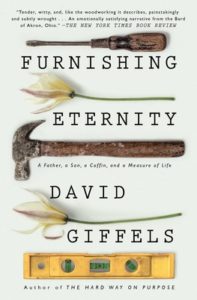 Furnishing Eternity: A Father, a Son, A Coffin, and a Measure of Life David Giffels (Scribnerr) $16.00 I had not read a single review of this, but the title itself — gosh, even those first two words should be award winning for a great title! — and the beautiful, beautiful cover made me pick it up. I told groups about it when it first came out, people who like well-written memoir, good stories, fine writing about the meaning of life that isn’t pushy or propaganda. For readers who like those who press into the mysteries by telling a good story with eloquence and good humor.
Furnishing Eternity: A Father, a Son, A Coffin, and a Measure of Life David Giffels (Scribnerr) $16.00 I had not read a single review of this, but the title itself — gosh, even those first two words should be award winning for a great title! — and the beautiful, beautiful cover made me pick it up. I told groups about it when it first came out, people who like well-written memoir, good stories, fine writing about the meaning of life that isn’t pushy or propaganda. For readers who like those who press into the mysteries by telling a good story with eloquence and good humor.
Well, did I under-sell this. It is brilliantly written, doing all of the above in spades. Giffels is a great writer, turning phrase after phrase that made me catch my breath, even as he writes about boyhood plywood projects or going to a lumber yard with his aging father. How eloquent can a guy be talking about lumber, you ask? Pretty damn eloquent, I’d say. Giffels is a master of common-place prose and it made Furnishing Eternity a true delight. I can’t tell you enough how much I loved his writing Akron writing style.
Speaking of which, Giffels was raised by a book-loving mother — she owned the whole big set of OOD, which many a library doesn’t even own — and he teaches creative writing at University and has two other books under his belt, so he’s no novice. (He previously wrote a great volume we stock called The Hard Way: Dispatches from the Rust Belt and another memoir called All the Way Home: Building a Family in a Falling-Down House. He used to be on NPR and has written for, get this, MTV’s Beavis and Butthead. Like I said, not a novice.)
Besides the spectacular craft of his witty, blue-collar eloquence — is that a style? I disagreed with Publishers Weekly saying it was “a sweetly mordant” — the book is tender without being sentimental, raw without being morbid. He is, you understand, making his coffin with his wood-working father. Part of it is that Giffels is cheap and can’t abide paying the crazy-high prices for those big caskets with the fancy presidential names. Also, he loves to do these kinds of projects. As his mother is dying of cancer and his father falls ill, he is forced to consider his own mortality. Furnishing Eternity is literally about making a casket (called a coffin in most other English speaking countries) with his dad. Hence the trip to the lumber section of Home Depot and his rumination about more glorious wood choices at the local lumber yard that had just burned down.
With chapter titles like “Measure Twice, Cut Once” it really does have some stuff about wood-working, although most of the writing is the bigger backstory. I liked the line from one reviewer who called it “a saga of death and carpentry.” Kirkus Review put it simply, saying Furnishing Eternity is “a lifetime’s worth of workbench philosophy in a heartfelt memoir about the connection between a father and son.”
I so enjoyed this book and I enjoyed it on multiple levels. It is doubtlessly one of my favorite books of recent years and a Best Book of 2018.
Is it possible to write about the death of your mother, the death of your best friend, the coming death of your father and the inevitable death of yourself in a context that’s both honest and lighthearted? Only if you are David Giffels, and only if you also include some practical information about woodworking. This book is like a Randy Newman song.”
Chuck Klosterman, New York Times bestselling author of But What If We’re Wrong?
“Giffels does the rare emotional work of peering behind the curtain of the father-son relationship, and examining it under the press of mortality. He writes with honesty, humor but above all generosity. We could all learn something from these excellent pages.” Alexandra Fuller, author of Quiet Until the Thaw
“Obituary writers know our job is essentially reassessing life through the lens of death, searching for lessons. Giffels’ writing is clever, vivid, hilarious and touching without ever being maudlin. He writes with the humor, expertise, reflection and precision of Steve Martin, Jessica Mitford and Bob Vila sharing a drink at a wake. In the process, he and his family have constructed a story filled with lasting lessons for us all.” —Jim Sheeler, Pulitzer Prize-winning reporter and author of Final Salute and Obit
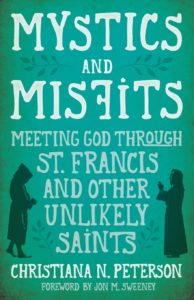 Mystics and Misfits: Meeting God Through St. Francis and Other Unlikely Saints Christiana Peterson (Herald Press) $16.99 We announced this at BookNotes with great delight and I noted that throughout this memoir the author has sidebars about various saints — Francis, Clare, Julian of Norwich, Margery Kempe, who she has an uneasy relationship with, and more — including some letters written to them. This is wonderful stuff, great for those exploring these old saints for the first time.There is a very nice foreword by spiritual writer Jon Sweeney, a former fundamentalist who learned of the mystics, especially Francis, from Mennonites (which is appropriate since Peterson and her husband joined a Mennonite rural community.) The titles refers to these mystics, but what I loved most about it was less about the contemplative journey but as a well-told memoir about a young married couple trying to find a more simple lifestyle, leaving the bustle and high-power work of Washington DC to a farming community in the rural mid-West.
Mystics and Misfits: Meeting God Through St. Francis and Other Unlikely Saints Christiana Peterson (Herald Press) $16.99 We announced this at BookNotes with great delight and I noted that throughout this memoir the author has sidebars about various saints — Francis, Clare, Julian of Norwich, Margery Kempe, who she has an uneasy relationship with, and more — including some letters written to them. This is wonderful stuff, great for those exploring these old saints for the first time.There is a very nice foreword by spiritual writer Jon Sweeney, a former fundamentalist who learned of the mystics, especially Francis, from Mennonites (which is appropriate since Peterson and her husband joined a Mennonite rural community.) The titles refers to these mystics, but what I loved most about it was less about the contemplative journey but as a well-told memoir about a young married couple trying to find a more simple lifestyle, leaving the bustle and high-power work of Washington DC to a farming community in the rural mid-West.
Even for those who haven’t experimented with intentional living or read much about utopian communities, the back-to-the-land movement of the 70s, or the newer contemporary monastic movements, this story of a fairly mainstream couple moving to share life in this Mennonite gathering (of separate homes and land) is captivating.
Plow Creek is the name of the intentional community Christiana and her husband discovered and with a bit of prayer and vetting — but not as much as one might think — off they went to take up their new lives as part of this faith-based community. And, wow, what a journey. What a story! Peterson is an honest and good writer and I was hooked as she so beautifully told of the experiences at Plow Creek, the descriptions of the joys and hardships of farm labor, realizing the different sort of faith traditions and personalities in the community, the struggle with members, volunteers, interns, are all told with verve and clarity. Which is to say, I couldn’t put it down. Each night I’d read more — yes, appreciating the interludes with pieces on St. Francis or Dorothy Day, and, yes, appreciating Peterson’s own journey learning about Nouwen and Merton, deepening her faith as she experimented with spiritual writings of this classic sort and dabbled in contemplative prayer herself. (Again, the blurbs are by writers like Richard Rohr, who she nicely describes reading, by the way) but be aware, the book is more about the misfits than the mystics. And much more about loss and endurance than prayer and ecstasy. It is a memoir, not a guide to contemplation, but she does introduce us to many historical figures and her description is excellent. Even those familiar with these saints will learn something new!
Listen to these two reflections on the book:
“I cried healing tears as I read this book. Christiana N. Peterson’s breathtaking way with words, coupled with her rare perception–her ability to name unseen movement in the air around grief, family, and community, and the mysterious shifts in the soul–left me pared back and longing for the deeper, more honest things of faith. Anyone grappling for words to express the strange intermingling of joy and suffering needs to look no further. Peterson brings in the misfits (the saints and the readers both), looks us in the eyes, and makes room for us to embrace the only thing we can in the midst of this nuanced, beautiful, and painful life in the flesh. She makes room for us to embrace the mystical misfit within us all.”
–Amber Haines, author of Wild in the Hollow
“In Christiana N. Peterson’s beautifully told memoir, the reader comes to understand that our relationships with saints living and dead can take many forms but that at their heart, they are about the compassion that draws us into community. Peterson deftly sketches the optimism that drew her to an intentional Mennonite community as well as the difficulties of community and family life while carrying on conversations with her chosen groupings of Catholic saints. It’s an unexpected juxtaposition that works beautifully.” –Kaya Oakes, author of Radical Reinvention
Both of those authors, by the way, Amber Haines, a former evangelical, and Kaya Oakes, a Catholic punk rocker, have done spiritual autobiographies that blew me away. I am glad to see Christiana Peterson’s Mennonite publisher drawing on these sorts of good writers to endorse this book. It is a good, good work and should be very widely read. I gladly name it as one of my favorite books of 2018. You’ll have to get it yourself to see how the Plow Creek story unfolds and how Christiana and Matthew and their children fared in this experiment with community. You don’t want to miss it.
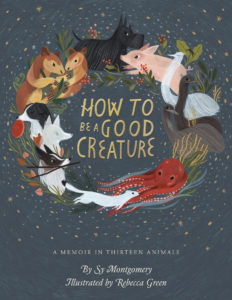 How To Be A Good Creature: A Memoir in Thirteen Animals Sy Montgomery, illustrated by Rebecca Green (HMH) $20.00 Without a doubt, this is was one of the enjoyable and moving books I read this year. I was surprised, actually, by how much I liked it. The story is simple — Sy Montgomery is a serious animal lover and a scientist of sorts, and each chapter is a part of her life as told through the lens of her relationship with an animal. From her own dog (and pig!) to extraordinary journeys to a Southern Pacific cloud forest to study rare tree kangaroos to the opening piece on making eye contact with emus in the Australian Outback.
How To Be A Good Creature: A Memoir in Thirteen Animals Sy Montgomery, illustrated by Rebecca Green (HMH) $20.00 Without a doubt, this is was one of the enjoyable and moving books I read this year. I was surprised, actually, by how much I liked it. The story is simple — Sy Montgomery is a serious animal lover and a scientist of sorts, and each chapter is a part of her life as told through the lens of her relationship with an animal. From her own dog (and pig!) to extraordinary journeys to a Southern Pacific cloud forest to study rare tree kangaroos to the opening piece on making eye contact with emus in the Australian Outback.
As I said in our earlier BookNotes review, this is an immediately attractive book for those that like creative and whimsical design, but don’t let the colorful, child-like look confuse you, let alone dissuade you, for considering this extraordinary, thoughtful, beautifully-written book. I forget how we first discovered this – maybe from the brilliant Brain Pickings blog by the genius Maria Popova. It’s that kind of book: about nature and science and human psychology and meaning; it is full of nuance and wit, the wonder of life and startling truth. And it is nicely illustrated. It is, as the subtitle suggests, a study of what it means to learn from a certain animal, with each chapter exploring a certain creature.
The first line of the just-jacket reads: “Understanding someone who belongs to another species can be transformative.” Indeed. How to Be a Good Creature is a great read for anyone who loves animals, for those who sense they are connected well to other living things, or who exhibits great empathy. This collection of animal stories is for the curious and caring, what one reviewed called “a rare jewel” and what another described as “a superbly crafted memoir,” saying it “brims with wonder, empathy, and emotion.” Beth and I both loved this book (Beth has been reading many of the chapters twice for the sheer joy of it.) I will spare you the Biblical justification for caring about creation, as I trust you understand that. You will understand it more deeply by enjoying this set of interlocking narratives. One of the Best Books of 2018.
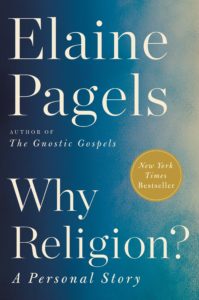 Why Religion: A Personal Story Elaine Pagels (Ecco) $27.99 Neither Beth nor I have read this fully, but we wanted to name it because people have told us it is extraordinary. The story is remarkable — one of the leading scholars of gnosticism who went forward at a Billy Graham rally as a teen, and hung out with Jerry Garcia. Her longing to be a dancer with Martha Graham, her being groped as a young academic in religious studies, her earning national awards for contributions to history and humanities. One customer of our insisted with great passion that it was perhaps the best book of this sort she has ever read! We heard Pagels on NPR and we were very moved, eager to sell the book, despite some misgivings about her own personal scholarship and views about topics such as the gnostic gospels or the nature of Satan or how one determines what is true about anything, actually.
Why Religion: A Personal Story Elaine Pagels (Ecco) $27.99 Neither Beth nor I have read this fully, but we wanted to name it because people have told us it is extraordinary. The story is remarkable — one of the leading scholars of gnosticism who went forward at a Billy Graham rally as a teen, and hung out with Jerry Garcia. Her longing to be a dancer with Martha Graham, her being groped as a young academic in religious studies, her earning national awards for contributions to history and humanities. One customer of our insisted with great passion that it was perhaps the best book of this sort she has ever read! We heard Pagels on NPR and we were very moved, eager to sell the book, despite some misgivings about her own personal scholarship and views about topics such as the gnostic gospels or the nature of Satan or how one determines what is true about anything, actually.
Be that as it may, Pagels is one of the legendary scholars of religion in American and is in some ways emblematic of a certain sort of non-Christian scholar who is greatly respected in the field and as such, her story is important to read. Still, I wondered how interesting her life could be, studying and writing about arcane stuff as she does, reading Coptic, writing books? But, boy, was I wrong: Pagels writes thoughtfully and beautifully, by all accounts (one important reviewer called it “luminous”) of the deepest things of life, including the tragic death of her son — he died in her arms at age 6 — and, a year later, the shocking loss of her husband (who fell to his death while hiking) and other immeasurable hardships and perplexities. Her life has been anything but dull and her writing is vivid. This is a serious study of culture by way of a very potent memoir of a fascinating life.
Here are some of the rave reviews Why Religion? A Personal Story has garnered; it is hard to avoid the consensus among the cultural gatekeepers that this book is a must-read and worthy of our consideration. I’m hoping to finish it soon, searing as it is.
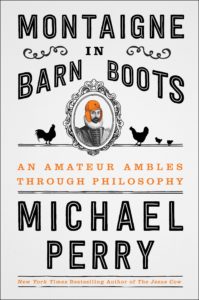 Montaigne in Barn Boots: An Amateur Ambles Through Philosophy Michael Perry (Harper) $25.99 Beth would say that the first coupla pages are so beautiful in their homespun way that it is worth buying to book for that joy alone. She and I both agree that this was one of the most fascinating, wonderful, interesting and funny books we read all year.
Montaigne in Barn Boots: An Amateur Ambles Through Philosophy Michael Perry (Harper) $25.99 Beth would say that the first coupla pages are so beautiful in their homespun way that it is worth buying to book for that joy alone. She and I both agree that this was one of the most fascinating, wonderful, interesting and funny books we read all year.
I have tried over and over to convince folks that the essays and memoirs of this blue-collar Wisconsin rural guy are worth reading, every single one. From memoir-ish storytelling in Population 485 Meeting Your Neighbors One Siren at a Time to Visiting Tom: A Man, a Highway, and the Road to Roughneck Grace to Coop: A Family, a Farm, and the Pursuit of One Good Egg to Truck: A Love Story and his several collection of hilarious collections of short essays (we named Roughneck Grace: Farmer Yoga, Creeping Codgerism, Apple Golf, and Other Brief Essays from on and Off the Back Forty one of our favorite reads in 2016!) this is an author who has a way with words, an aww-shucks sort of self-deprecating humility, and an earnest demeanor. And man, can he spin a good tale.
I’d read anything he writes, but this is curious, perhaps his most serious. Perry may come across a bit like those up North guys standing in the cranberry bogs in those TV commercials, but he’s smart as heck. In Montaigne in Barn Boots he tells how he has discovered the 1700s French philosopher. Montaigne wrote about all manner of stuff — including sex and apparently quite a bit of adolescent humor, which makes him perfect for the shameless Mr. Perry. Yet, it gets serious, pondering God and marriage and justice and illness. Perry himself has been in more pain than I think I ever would have guessed and he is vulnerable here without being saccharine. He is exceptionally thoughtful without being dense. Between barnyard jokes and small town stories and not a little bit of personal back story, Perry invites us to join in the ongoing conversation about this world-famous figure.
Perry knows the secondary literature (and there is a lot.) He’s a good teacher. Between guffaws, you’ll learn a bit. But here is what I really loved: you’ll be introduced to how a guy comes to enjoy learning about important philosophical stuff. Even while being a forgetful and sloppy worker and an anxious writer and a less than fully successful breadwinner, he’s buying books and learning up and sharing this story about his love of learning. I bet you’ve never read anything like this. Believe it or not this is absolutely a Best Book of 2018. Beth and I both say it is very highly recommended.
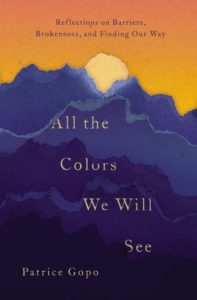 All the Colors We Will See: Reflections on Barriers, Brokenness, and Finding Our Way Patrice Gopo (Thomas Nelson) $16.99 I so enjoyed this and thought it so very interesting and well written that we exclaimed about it at BookNotes late last summer when it first came out. Many of been reading more than ever on books by people of color, memoirs and reflections to help us understand our culture these days and learn to be more effective agents navigating various subcultures and to somehow be able to do the work of being agents of God’s reconciliation. All the Colors We Will See is simply a lovely volume, and the author is remarkable, as a gifted writer and as one with a curious, interesting story. A great blurb on the back by award-winning writer Bret Lott is pretty special, too — such an endorsement assures us we are on firm ground naming this as one of the Best Books of 2018. He notes that Gopo’s “calm voice and winsome demeanor” allows her to speak hard truths… including “what it takes to continue in Christ’s love despite the fallen and falling world around us.”
All the Colors We Will See: Reflections on Barriers, Brokenness, and Finding Our Way Patrice Gopo (Thomas Nelson) $16.99 I so enjoyed this and thought it so very interesting and well written that we exclaimed about it at BookNotes late last summer when it first came out. Many of been reading more than ever on books by people of color, memoirs and reflections to help us understand our culture these days and learn to be more effective agents navigating various subcultures and to somehow be able to do the work of being agents of God’s reconciliation. All the Colors We Will See is simply a lovely volume, and the author is remarkable, as a gifted writer and as one with a curious, interesting story. A great blurb on the back by award-winning writer Bret Lott is pretty special, too — such an endorsement assures us we are on firm ground naming this as one of the Best Books of 2018. He notes that Gopo’s “calm voice and winsome demeanor” allows her to speak hard truths… including “what it takes to continue in Christ’s love despite the fallen and falling world around us.”
Another reviewer said it was written with “eloquence born of pain and longing.”
Patrice Gopo grew up in Anchorage, Alaska, the child of Jamaican immigrants who had little experience being black in America. How’s that for an opening salvo, an intriguing invitation to lean in and say, “tell me more”?
That she lived in Pittsburgh for a while makes it that much more enjoyable for some of us who love that city. Importantly, she navigates the shift in cultures, telling about living in the deep south, reflecting on immigration questions, turning her voice (as it says nicely on the back cover) “to themes such as marriage and divorce, the societal beauty standards we hold, and the intricacies of living out our faith.”
There is a simple eloquence here, and it is clear that this poetic writer has born pain and can teach us much about resilience, about longing, about differences and race and justice. So much in one story, eh? You should get this for your next book club and you’ll have much to discuss, I promise.
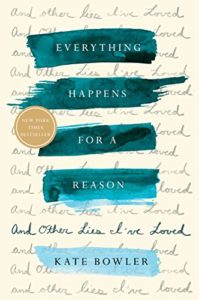 Everything Happens for a Reason And Other Lies I’ve Loved Kate Bowler (Random House) $26.00 I hesitated to list this as I’m sure most BookNotes readers would know that it has won many awards and was much discussed earlier this year. It is what I called in BookNotes earlier this year “achingly beautiful.” Ms Bowler has garnered so much buzz and has been reviewed so well, it is nearly a publishing phenomenon, riding the best-seller list for much of the year and ending on lots of year’s end Best Books lists. Perhaps in league with the stunning When Breath Becomes Air or Being Mortal it is a book about ultimate things that is exceptionally insightful, beautifully written, raw and wise (and irreverent and funny, too, believe it or not.) With advanced rave reviews from Publishers Weekly and Kirkus, Bowler’s reflection on dying has become a touchstone for many conversations these days.
Everything Happens for a Reason And Other Lies I’ve Loved Kate Bowler (Random House) $26.00 I hesitated to list this as I’m sure most BookNotes readers would know that it has won many awards and was much discussed earlier this year. It is what I called in BookNotes earlier this year “achingly beautiful.” Ms Bowler has garnered so much buzz and has been reviewed so well, it is nearly a publishing phenomenon, riding the best-seller list for much of the year and ending on lots of year’s end Best Books lists. Perhaps in league with the stunning When Breath Becomes Air or Being Mortal it is a book about ultimate things that is exceptionally insightful, beautifully written, raw and wise (and irreverent and funny, too, believe it or not.) With advanced rave reviews from Publishers Weekly and Kirkus, Bowler’s reflection on dying has become a touchstone for many conversations these days.
Bowler was somewhat known for an Oxford University Press book called Blessed which studied the prosperity preachers. She became a professor at Duke Divinity School. She became a young mom and then got the terrible news about her Stage IV colon cancer. She tells her story bringing us in to a colorful cast of characters with almost unbelievable candor and courage. And what a writer she is!
Her gifts and guts have made Bowler’s Everything Happens…and Other Lies… one of the most respected and truly great books of 2018.
As Glennon Doyle writes:
I fell hard and fast for Kate Bowler. Her writing is naked, elegant, and gripping – she’s like a Christian Joan Didion. I left Kate’s story feeling more present, more grateful and a hell of a lot less alone. And what else is art for? Everything Happens for a Reason is art in its highest form, and Kate Bowler a true artist – with the pen, and with her life.
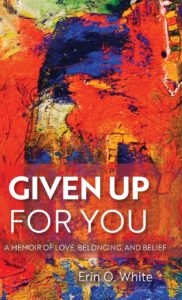 Given Up For You: A Memoir of Love, Belonging, and Belief Erin O. White (University of Wisconsin Press) $26.95 There are certain books that are so captivating to me, the reading of them such a full-bodied experience, that I recall where I sat, how the light fell on the page, how I felt, wiping away tears from my cheek with the back of my hand, and reading portions out lout to my own beloved spouse. Such memories are dear to me, and this was one of the most precious books for me this year. Yet, I know that some will not be as affection toward it as I would hope. It is a love story, a love story between a lesbian couple. And it was very, very well written, very moving, very enlightening for those of us who are not much experienced in such things.
Given Up For You: A Memoir of Love, Belonging, and Belief Erin O. White (University of Wisconsin Press) $26.95 There are certain books that are so captivating to me, the reading of them such a full-bodied experience, that I recall where I sat, how the light fell on the page, how I felt, wiping away tears from my cheek with the back of my hand, and reading portions out lout to my own beloved spouse. Such memories are dear to me, and this was one of the most precious books for me this year. Yet, I know that some will not be as affection toward it as I would hope. It is a love story, a love story between a lesbian couple. And it was very, very well written, very moving, very enlightening for those of us who are not much experienced in such things.
The story, of course, is complicated, but I must say that as a narrative it is compelling and beautiful and humane. The writer is herself a writing instructor and has been published in good outlets such as the wonderful Portland Magazine and The New York Times. Her craft is part of the story, I suppose, as any book about an academic and writer would be.
Ms. White is a serious seeker after God, a sophisticated intellectual who through yearning and pondering concluded she wanted to go to Catholic confirmation class, learning the ancient ways of Christian belief and practice. She was drawn in by good leaders and stimulated by good theology. In the late 1990s she spent Saturday nights with her girlfriend and Sunday mornings in church. Eventually, of course, she is not permitted to join the church and much of the writing here laments “the faith denied.”
This is not an uncommon story, and I’ve read other moving memoirs of LGBTQ Christians, including those from evangelical backgrounds. From Jeffrey’s Chu’s excellent Does Jesus Really Love Me?: A Gay Christian’s Pilgrimage in Search of God in America to Justin Lee’s Torn to the must-read, riveting Boy Erased: A Memoir of Identity, Faith, and Family (one of the most moving books I read this year, but it came out in 2017) there are many, many poignant memoirs and stories where gay persons of faith offer a glimpse into their lives. This testimonies are gifts to those of us who might not have gay friends who have shared the struggles of their interior lives. I ought not need to say this, but as a reminder, it might be wise to always recall that we enjoy and benefit from the genre of memoir not to firstly ask if we like or agree with a person’s story, but to understand. Looking over the shoulder, seeing how people narrate and make sense of their lives is always instructive and brings the “human face” to theological or policy debates, whether about the controversies of immigrants or soldiers or people of other races or other religions or those with same-sex attractions.
And so, as memoir, Give Up for You, is masterful. The title itself echoes with multiple, multiple meanings as this queer woman was turned away by her church, unable to be received because of her commitment to her lover. (Further, her lover, who Erin eventually marries, is herself not a believer.) On so many levels this is a complex, human drama, a well-told story of love and hurt, exclusion and embrace, hurt and desire. Some of it made me very sad.
It includes some exceptionally lovely writing about married life, decision making about the mundane things, balancing home and work and life and differences. Her telling of babies and raising an infant and how motherhood changes things was wonderful.
There is much to admire about Erin White’s integrity, her struggle to reconcile, as one reviewer put it, “the rival claims of queer desire and Catholic faith.” It is of course an anguishing question — what will I give up for God? What does God expect? And, naturally, what will I give up for my beloved? What does it mean to be true to oneself? How do any of us navigate disagreements — even deep, deep, disagreements — between us and our families and loved ones? This story is captivating and painful and gloriously written and I am sure I will never forget it.
I do not want to spoil too much but there is a small side plot, after Erin realizes she cannot be a good Catholic, when she and Greta attend an open and affirming mainline Protestant church with less rigorous theology and liturgy, but that is fully accepting of them. It is a fascinating telling of that season, in that church and pastor, which finally proves unfulfilling for them. Allow me to say that I have friends that could have written this portion of the book, and that the spiritual matters in Given Up for You sounded remarkable familiar, even if the causes of the fracture between congregant and church (between believer and God?) were different.
Here are some blurbs that endorse it, suggesting how many found it wondrous. I do not know anything about these writers (except one) but find their words helpful in understanding this religious love story and how and why it resonates so.
–Leni Zumas, author of Red Clocks
–Sarah Sentilles, author of Breaking Up with God
–Jennifer Finney Boylan, author of She’s Not There
MORE AWARD WINNING MEMOIRS and BIOGRAPHY
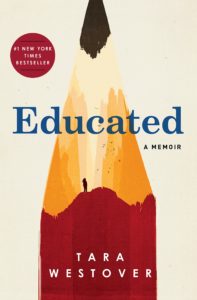
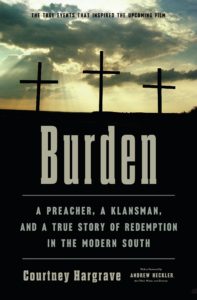 I cannot stop naming these books that so moved me this past year. As you can see, Beth and I both read a lot of memoirs, and so many were almost stunning, we were entralled and pulled into their stories. It is hard to award one without thinking of others that so moved us this year. From Tara Westhover’s much-discussed Educated: A
I cannot stop naming these books that so moved me this past year. As you can see, Beth and I both read a lot of memoirs, and so many were almost stunning, we were entralled and pulled into their stories. It is hard to award one without thinking of others that so moved us this year. From Tara Westhover’s much-discussed Educated: A 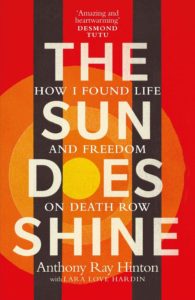 Memoir (Random House; $28.00) to Courtney Hargrave’s satisfying Burden: A Preacher, a Klansman, and a True Story of Redemption in the Modern South (Convergent; $26.00) to the incredible The Sun Does Shine: How I Found Life and Freedom on Death Row by former (wrongly imprisoned) client of Bryan Stevenson, Anthony Ray Hinton (St. Martin’s Press; $26.99) these all must be touted this year. Each of these books provided hours of entertainment, educating us and inspiring us. I reviewed all three in a bigger column last fall, and you may want to revisit my long explanations if you don’t recall. These are surely among the best books of 2018.
Memoir (Random House; $28.00) to Courtney Hargrave’s satisfying Burden: A Preacher, a Klansman, and a True Story of Redemption in the Modern South (Convergent; $26.00) to the incredible The Sun Does Shine: How I Found Life and Freedom on Death Row by former (wrongly imprisoned) client of Bryan Stevenson, Anthony Ray Hinton (St. Martin’s Press; $26.99) these all must be touted this year. Each of these books provided hours of entertainment, educating us and inspiring us. I reviewed all three in a bigger column last fall, and you may want to revisit my long explanations if you don’t recall. These are surely among the best books of 2018.
Please read about them here.
TWO MUSICAL BIOGRAPHIES
I have already written much about one of these, but want to keep the reputation of Hearts & Minds for always listing some books about rock and rollers. I hope you recall my reviews in past years of Testimony by Robbie Robertson of The Band, Rumours of Glory by Bruce Cockburn, or Steve Turner’s wonderful Beatles ’66: The Revolutionary Year and other interesting books about rock stars.
Here are two more for 2018.
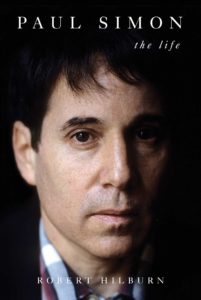 Paul Simon: The Life Robert Hillburn (Simon & Schuster) $30.00 There has yet to be a really good biography of the legendary singer-songwriter and this one finally is the one, the one some of us have been waiting for. (Simon cooperated with it, which explains only part of its brilliance.) It’s been called “a straight-shooting tour de force” by USA Today and “epic” by Rolling Stone. It comes with raves by the poet Billy Collins, Linda Ronstadt, Paul Muldoon, even early RS writer, Cameron Crowe, who knows a thing or two about all this. Hillburn is renowned as a rock critic and biographer and is the man for the job; the magazine No Depression says, Paul Simon: The Life “flows smoothly along on the river of his liquid prose.”
Paul Simon: The Life Robert Hillburn (Simon & Schuster) $30.00 There has yet to be a really good biography of the legendary singer-songwriter and this one finally is the one, the one some of us have been waiting for. (Simon cooperated with it, which explains only part of its brilliance.) It’s been called “a straight-shooting tour de force” by USA Today and “epic” by Rolling Stone. It comes with raves by the poet Billy Collins, Linda Ronstadt, Paul Muldoon, even early RS writer, Cameron Crowe, who knows a thing or two about all this. Hillburn is renowned as a rock critic and biographer and is the man for the job; the magazine No Depression says, Paul Simon: The Life “flows smoothly along on the river of his liquid prose.”
Listen to what Bono says:
There are two great storytellers colliding here. There’s no tougher a mind, no more tender a voice than Paul Simon, and there’s no better man than Robert Hilburn to decipher the hardwiring of this hyperintellect. From the prologue I was sucked in, suckered into a sense that I too might discover the genetic code of some of the greatest songs of any century. By the epilogue, you realize the great songs can never be fully explained, but the great man on his way to find those songs surely can.
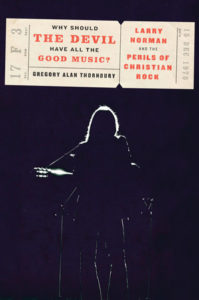 Why Should the Devil Have All the God Music? Larry Norman and the Perils of Christian Rock Gregory Alan Thornbury (Convergent) $26.00 Yes! Thank you Greg Thornbury for writing this book that cried out to be written, surely one of the best books of 2018.
Why Should the Devil Have All the God Music? Larry Norman and the Perils of Christian Rock Gregory Alan Thornbury (Convergent) $26.00 Yes! Thank you Greg Thornbury for writing this book that cried out to be written, surely one of the best books of 2018.
As I said in a major BookNotes review of it last March when it first came out, this is a fabulously interesting book and, like the best rock and roll biographies, it includes lots of stuff about music and song lyrics and production of albums and rock tour stories, but also fair amount of fun celebrity gossip and, thank goodness, some social and cultural and religious commentary. How can one reflect on an artist who hung out with The Jefferson Airplane and opened for Jimi Hendrix and chatted with Paul McCartney and sang about racism and poverty and against the rootlessness of a materialistic generation not explain a bit about the ethos of the 1960s? Norman came of age, and gave voice to Christian faith amidst the California counter-culture; his art was a loud and often-controversial critique of bad religion and boring church and it stood (at least in the early days) as part of the broader zeitgeist which critiqued the bankrupt values of the American dream and the sins of the American empire.
I said, then, and still believe, that Why Should the Devil… gives us the very best study yet of the odd Christian folkie-rocker and One Way leader and it is nothing short of a must-read for anyone interested in rock music of the 60s & 70s and onward, how the Jesus Movement emerged from the hippy counter-culture, and how this gave rise, oddly – yep, this is true — to the rise of the Christian right in the 1980s and 90s.
Please visit here to read the entire review, showing why I want to celebrate Mr. Thornbury’s book as one of the Best of 2018 and a personal fav. (Notice, though, that the free offer is now expired.)
FAVORITE NOVELS
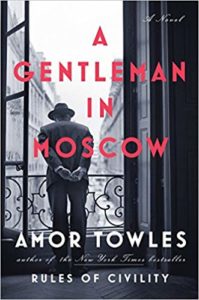 A Gentleman in Moscow Amor Towles (Viking) $27.00 Just a few days ago a customer new to our store was gabbing and in the middle of deep conversation let out a yelp, a delightful cry of discovery, as she picked up A Gentleman in Moscow from our fiction shelves and exclaimed how much she loved it. I think she was also expressing a little surprise that a so-called Christian bookstore would carry a secular best-seller. And, I am sure, a bit of a “you to?” question — that question we have when we so love a book and wonder if others share our joy. Beth would certainly say that this was her favorite book of 2018. I’ve heard plenty about it, from customers and from her, and intend to read it myself, soon.
A Gentleman in Moscow Amor Towles (Viking) $27.00 Just a few days ago a customer new to our store was gabbing and in the middle of deep conversation let out a yelp, a delightful cry of discovery, as she picked up A Gentleman in Moscow from our fiction shelves and exclaimed how much she loved it. I think she was also expressing a little surprise that a so-called Christian bookstore would carry a secular best-seller. And, I am sure, a bit of a “you to?” question — that question we have when we so love a book and wonder if others share our joy. Beth would certainly say that this was her favorite book of 2018. I’ve heard plenty about it, from customers and from her, and intend to read it myself, soon.
Here is the bare-boned description from the publisher: “When, in 1922, Count Alexander Rostov is deemed an unrepentant aristocrat by a Bolshevik tribunal, he’s sentenced to house arrest in the Metropol, a grand hotel across the street from the Kremlin. Rostov, an indomitable man of erudition and wit, has never worked a day in his life, and must now live in an attic room while some of the most tumultuous decades in Russian history are unfolding outside the hotel’s doors. Unexpectedly, his reduced circumstances provide him a doorway into a much larger world of emotional discovery…”
Many of enjoyed this sprawling, witty, surprising novel, and it is on many people’s Best Books lists. It has been called winning, stylish, perfect, elegant, and irresistible. Don’t you want to order one today?
Here is what the prestigious Kirkus Review says:
In all ways a great novel, a nonstop pleasure brimming with charm, personal wisdom, and philosophic insight.this book more than fulfills the promise of Towles’ stylish debut, Rules of Civility.”
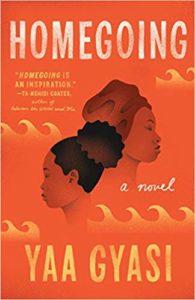
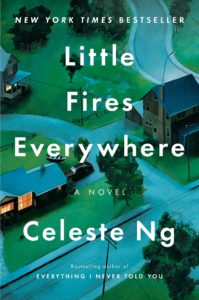
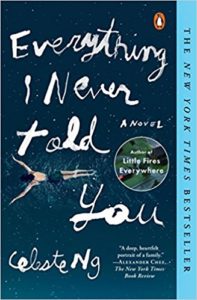
While speaking of Beth’s most memorable novels this year, she reports that some of the favs that she read in 2018, had come out previously.
For instance, Homegoing by Yaa Gyasi (VIntage; $16.00), the much-discussed Little Fires Everywhere (Viking; $27.00) and Everything I Never Told You (Penguin; $16.00), both by Celeste Ng.
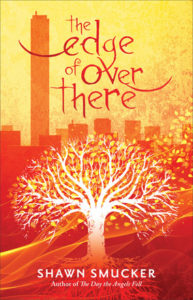 The Edge of Over There Shawn Smucker (Revell) $17.99 Okay, this is another fictional gem that I didn’t read but that Beth adored. It’s YA fantasy, and that’s not my genre, but, whew, even though Beth rarely reads fantastical stuff like this, she was hooked by the first one, The Day the Angels Fell.
The Edge of Over There Shawn Smucker (Revell) $17.99 Okay, this is another fictional gem that I didn’t read but that Beth adored. It’s YA fantasy, and that’s not my genre, but, whew, even though Beth rarely reads fantastical stuff like this, she was hooked by the first one, The Day the Angels Fell.
You know a book is captivating when a reader can’t wait for a sequel, and she thought The Edge of Over There was well written, entertaining, and thought-provoking. Really. This sequel is engrossing and when we met the author for the first time, the first thing Beth wanted to know is what is going to happen to 16 year-old Abra and her search for the next Tree of Life.
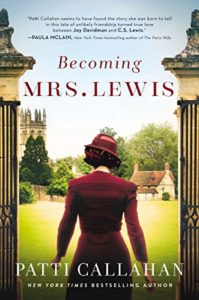 Becoming Mrs. Lewis Pattie Callahan (Thomas Nelson) $25.99 Not a few C.S. Lewis fans have hoped for a book like this for decades. It is a beautifully-told, well-realized, fictional telling of what Joy Davidman might have gone through as she married the famous Oxford don. It came out in the tail end of 2018 and became an immediate best seller.
Becoming Mrs. Lewis Pattie Callahan (Thomas Nelson) $25.99 Not a few C.S. Lewis fans have hoped for a book like this for decades. It is a beautifully-told, well-realized, fictional telling of what Joy Davidman might have gone through as she married the famous Oxford don. It came out in the tail end of 2018 and became an immediate best seller.
Here are some of the good endorsements that show why this is deserving of being on the Best of 2018 list.
;”I thought I knew Joy Davidman, the oft mentioned but little examined wife of C. S. Lewis, but in Becoming Mrs. Lewis, Patti Callahan breathes life into this fascinating woman whose hunger for knowledge leads her to buck tradition at every turn. In a beautifully crafted account, Patti unveils Joy as a passionate and courageous–yet very human–seeker of answers to the meaning of life and the depths of faith. Becoming Mrs. Lewis is an unlikely love story that will touch heart, mind, and soul.” –Diane Chamberlain bestselling author of The Dream Daughter
“Patti Callahan took a character on the periphery, one who has historically taken a back seat to her male counterpart, and given her a fierce, passionate voice. For those fans of Lewis curious about the woman who inspired A Grief Observed this book offers a convincing, fascinating glimpse into the private lives of two very remarkable individuals.” —New York Journal of Books
Hey, this last one doesn’t hurt either: those of us who have met C.S. Lewis’s step son, Douglas Gresham, know that he’s a straight shooter. Here’s what he says:
“It’s not supposed to be a technical biography of my mother. It’s novel. And it’s a very good one. . . extraordinarily accurate. . . more accurate than most biographical essays that have been written about my mother.” Douglas Gresham, son of Joy Davidman
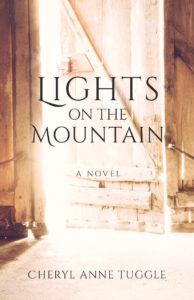 Lights on the Mountain: A Novel Cheryl Anne Tuggle (Paraclete Press) $17.99 This recent novel, set in Western Pennsylvania, North of Pittsburgh (with mentions of New Wilmington and the Beaver River and more), is beautifully rendered; it is offers gorgeous literary prose, and certain deserves accolades galore.
Lights on the Mountain: A Novel Cheryl Anne Tuggle (Paraclete Press) $17.99 This recent novel, set in Western Pennsylvania, North of Pittsburgh (with mentions of New Wilmington and the Beaver River and more), is beautifully rendered; it is offers gorgeous literary prose, and certain deserves accolades galore.
As I said in BookNotes when we announced a number of good novels, the story is written by an Orthodox writer and is set on a farm, and is about farming. (Move over Wendell Berry I can hear some saying!) Young Jess Hazel, the main character in the story, inherits his parents farm when he loses them in an accident. As it says on the back cover, “Unable to shake the memory of a strange light he has seen hovering the mountain peak above his valley home, he embarks on a pilgrimage — a halting inner odyssey riddled with fits and false starts.”
This story picks up speed as it goes but even from the prelude readers know this is a very artful, intelligent writer, and it will be savored slowly as good literary fiction often is. She has a poetic voice and the story is, as one reviewer put it, “as deep and rich as the ancient ground beneath the character’s feet.”
Paraclete Press does mature spiritual books, ecumenical and contemplative resources, mostly non-fiction that is always very well done. They have a few books about aesthetics and the arts, too, so they truly have a vision for making a distinctive contribution to the publishing world. When they do novels, they are certainly well worth owning. Lights on the Mountain is surprising, eloquent, entertaining, and spiritually enriching art. Kudos.
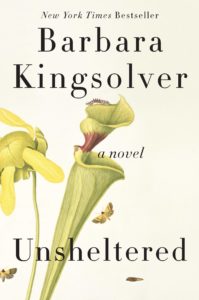 Unsheltered: A Novel Barbara Kingsolver (Harper) $29.99 This is a novel Beth and I (and one of our daughters) read late this fall and we are still pondering it. It may be my pick for favorite fiction this year. Beth, too (after The Gentleman in Moscow, maybe.) I hope you know Kingsolver’s early works (Bean Trees and Pigs in Heaven, and her essays which I love, like High Tide in Tucson and Small Wonder.) Too many only know her for Poisonwood Bible. So, read this one, one of the most discussed books of 2018!
Unsheltered: A Novel Barbara Kingsolver (Harper) $29.99 This is a novel Beth and I (and one of our daughters) read late this fall and we are still pondering it. It may be my pick for favorite fiction this year. Beth, too (after The Gentleman in Moscow, maybe.) I hope you know Kingsolver’s early works (Bean Trees and Pigs in Heaven, and her essays which I love, like High Tide in Tucson and Small Wonder.) Too many only know her for Poisonwood Bible. So, read this one, one of the most discussed books of 2018!
Here is some of what we wrote in BookNotes this fall:
This is profound and complicated but the short version is this: every other chapter tells of the lives of two families that reside in the same house in Vineland, New Jersey, one in the late 1800s and one in contemporary times. The house is falling apart which becomes an obvious metaphor for their struggles as families and for the town itself. Did you know that Vineland was an early planned community (founded by a guy named Landis who later moved to Central Pennsylvania?) Much of the plot of the story of the first family, set in the 1800s, is about a science teacher and, without spoiling too much, a character who is corresponding with Charles Darwin and Asa Gray, and a renegade newspaperman who is telling the truth about some of Landis’s injustices. The contemporary story — in that same house — is about an adjunct college prof and his wife, who is taking care of a brand new grand-baby (whose mother, their daughter in law, committed suicide shortly after childbirth.)
There’s a lot of politics in this as you’d expect from the ecologically-minded, lefty Kingsolver (one of the daughters of the contemporary couple just got back from living in Cuba for a while and disapproves of her brother’s work in the financial sector.) The New York Times review said
This is fiction rich in empathy, wit, and science… Kingsolver’s gifts are ‘fierce and wondrous’ with ‘colors moving around like fire.’
There is some vulgar language here but, still, Unsheltered is a novel which, as the Washington Post Book World review put it, “is on familiar terms with the eternal.” I don’t know about that, but it sounds right. This novel is richer and more interesting the further in goes and has stuck with me for months. It is seeking a better world, asking big questions about meaning and life and death and love and goodness and the idols of our times. I admire the talents and vision of the author and I enjoyed this complex book immensely. Maybe only because of Darwin’s role in the plot, it reminded me a bit of one of my all time favorite novels, the extraordinary, unforgettable The Signature of All Things by Elizabeth Gilbert. Kudos to Kingsolver for her craft, her cares, and her famous support for independent bookstores. It’s an honor to get to sell literature like this.
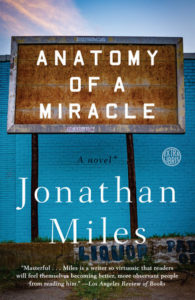 Anatomy of a Miracle: A Novel Jonathan Miles (Hogarth/Random House) $16.00 We all know about ties, close calls, draws. I suppose I want to honor the above-named Kingsolver Unshelterd as my favorite novel of 2018, but, to be honest, this one was one I tore through, turning the pages and wondering what was going to happen next. It, too, is a bit vulgar, but is nonetheless a story that is about God and faith and the meaning of things. I adored Anatomy of a Miracle, now out in paperback. As I said in a previous BookNotes review this summer, the author, Jonathan Miles, is theologically aware (quoting C.S. Lewis and others about the theodicy question) and portrays different sorts of skeptics, seekers, believers, and charlatans, all really, really well. In this story, a handicapped Afghanistan war vet one day just gets up out of his wheelchair while heading to the local convenience store to buy some smokes. (You could see this alluded to on the hardback book cover.)
Anatomy of a Miracle: A Novel Jonathan Miles (Hogarth/Random House) $16.00 We all know about ties, close calls, draws. I suppose I want to honor the above-named Kingsolver Unshelterd as my favorite novel of 2018, but, to be honest, this one was one I tore through, turning the pages and wondering what was going to happen next. It, too, is a bit vulgar, but is nonetheless a story that is about God and faith and the meaning of things. I adored Anatomy of a Miracle, now out in paperback. As I said in a previous BookNotes review this summer, the author, Jonathan Miles, is theologically aware (quoting C.S. Lewis and others about the theodicy question) and portrays different sorts of skeptics, seekers, believers, and charlatans, all really, really well. In this story, a handicapped Afghanistan war vet one day just gets up out of his wheelchair while heading to the local convenience store to buy some smokes. (You could see this alluded to on the hardback book cover.)
The parking lot of Biz-E-Bee, right there in post-Katrina Biloxi, Mississippi, becomes a pilgrimage site as others seeking healing flock there. In the meantime both a serious theologian from the Vatican — you learn why as the story unfolds — and the doctor of the now-walking/healed vet are trying to determine what in the world happened. For the secularist scientist, there simply cannot be such a thing as a miracle, so she has to run bunches of neurological and psychological tests to figure how the inexplicable happened. (Maybe he never was really a paraplegic? Maybe he’s a nut job, or a fraud?) When the reality TV show people come in with tinsel town promises (what a way to help others, they say!) all hell breaks loose.
And all of this, even from the preface, is reported as if it is all true.
Anatomy of a Miracle is a fun and fascinating story, by a writer who has been called “gripping and memorable” and “a rare original” and “raucously ambitions.” With blurbs from the likes of Dave Eggers and Joshua Ferris and Elizabeth Gilbert and Richard Russo, you should be aware of this. I thought it one of the best I read this year and it’s just out in paperback.
STUNNING NARRATIVE NON-FICTION
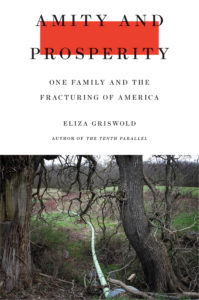 Amity and Prosperity: One Family and the Fracturing of America Eliza Griswold (MacMillan) $27.00 This was one of my personal favorites and one of the Best Books of 2018. What a story. I’ve taken the liberty of reprinting my review from BookNotes as we honor the amazing work this writer did in telling this story. Few readers outside of the greater Pittsburgh area will catch the reference of the title of the stunning new book, Amity and Prosperity, not realizing that they are names of two neighboring towns near Washington, PA. Locals know that these small towns are classic examples of the post-industrial geography of Western Pennsylvania. If Hillbilly Elegy famously portrayed the rustbelt ethos of Appalachian transplants into southern Ohio, Amity and Prosperity tells with vivid detail the contours of daily life in Washington and Green counties, the northern edge of Appalachia that is no longer sustained by coal fields or steel mills and that less than a decade ago faced an “energy gold rush” with an influx of workers and money and drugs, drilling for natural gas.
Amity and Prosperity: One Family and the Fracturing of America Eliza Griswold (MacMillan) $27.00 This was one of my personal favorites and one of the Best Books of 2018. What a story. I’ve taken the liberty of reprinting my review from BookNotes as we honor the amazing work this writer did in telling this story. Few readers outside of the greater Pittsburgh area will catch the reference of the title of the stunning new book, Amity and Prosperity, not realizing that they are names of two neighboring towns near Washington, PA. Locals know that these small towns are classic examples of the post-industrial geography of Western Pennsylvania. If Hillbilly Elegy famously portrayed the rustbelt ethos of Appalachian transplants into southern Ohio, Amity and Prosperity tells with vivid detail the contours of daily life in Washington and Green counties, the northern edge of Appalachia that is no longer sustained by coal fields or steel mills and that less than a decade ago faced an “energy gold rush” with an influx of workers and money and drugs, drilling for natural gas.
The subtitle: One Family and the Fracturing of America is a significant play on words as well as this riveting book is very much about the contested practice of industrial fracking and how its deadly side effects – poisoned air and water – disrupted these congenial small towns and the larger social fabric around Washington. From Cannonsburg to Eighty-four to Cecil Township, from Lower Ten Mile Presbyterian Church to the Subway restaurant at the Lone Pine truck stop, to Southpointe, the Range Resources headquarters near the corporate hub of the oil and gas boom, the specificity of the description is spot on, clearly recognizable for anyone who lives near or has visited south-central Washington County. Although the story is a page-turner exposing corporate injustices, dishonesty, and public malfeasance – one can hardly believe how bad it gets as one family fights back against the cover-ups of the poisoning of their water – it is still appealing to read about places one knows. (How I smiled when the author describes the strikingly odd anti-environmentalist billboards on the Pennsylvania Turnpike.) The book is being talked about throughout the county, but it really is a book about Yinzer territory.
But I can’t stress enough how universal all this is, how this tale is a story of everywhere.
Eliza Griswold is a talented and award-winning non-fiction writer, a reporter known for The Tenth Parallel, a book about inter-religious conflict mostly in the Middle East. In Amity and Prosperity she nearly embeds herself with several families and walks with them through their years of illness, losing their home, and their desperate sleuthing, investigating the poisons in their air and water. (Their own testing done with the help of local doctors proved that Range, the fracking company, was fudging the data and not being forthcoming about the chemical spills and toxic leaks from several of their fracking wells and storage ponds.) The book opens at the beloved Washington County Fair and the young people who show pigs and goats, their friendships nurtured through years in 4-H. As one teen’s animals get sick and mysteriously die, as does her neighbors prize winning horse, the reader is drawn in, knowing this portends great trouble that may not end well.
Griswold is an energetic writer and the characters she about which she tells are themselves colorful and raw and dogged, making this a great read. Their suffering seems relentless, their fears and foibles understandable, and we learn about all sorts of chronic illness, family struggles, and the consequences that bad environmental health has on their lives and community. (The social stress of speaking out among neighbors who might disapprove of their anti-fracking concerns and the differences of opinion about the vast amount of money the frackers offer, is portrayed realistically; some scenes are painfully awkward as long-time friends try not to fall out over their differences about selling out to Range.)
The plot unfolds as we see the impact this has on the teen-aged children, their extended families, their church friends, the local Fire Hall and such. Their hopes for vindication (and money for safe water service) are dashed over and over as the state DEP and the national EPA drop the ball, even on fairly obvious matters. The complicity of the DEP with the fracking industries and their refusal to press charges when environmental safeguards are disregarded are breathtaking.
Eventually a heroic lawyer couple, John and Kendra Smith, take on lawsuits against Range Resources, starting in the Washington Court of Common Pleas and eventually suing the State of Pennsylvania contesting pro-fracking policies of the Corbett administration in a case that went to the State Supreme Court. With simultaneous legal battles from Pittsburgh to Harrisburg, Amity and Prosperity becomes not only a glimpse into post-industrial small towns and the environmental consequences of fracking but also a legal thriller, worthy of any novel by Grisham. One observer called the lawyers “Mr. and Mrs. Atticus Finch.”
Do you know the movie Erin Brockovitch? This story makes that look like kid’s stuff. And it’s just as much of a ride. I hope some BookNotes readers order it.
Amity and Prosperity: One Family and the Fracturing of America tells of small town life with richly textured tales of the Izaak Walton League and the county fair and the local Bible study. It also tells about earthy folk who try to stick together, sharing a community fabric that unravels when outsiders bring huge upheavals and loads of money, all in the name of progress. It also expertly shows the big picture of state and national policy, of how laws and various administrative agencies enhance or diminish the social architecture of small towns and rural areas, of the human consequences of the red and blue ideologies vying for influence. Mostly it tells of some Western Pennsylvania families, some sick kids, some corrupt businesses, and the drama of speaking truth to power, learning to be a whistle blower, and finding the faith and courage to move on, despite all.
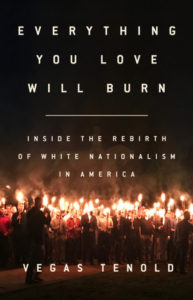 Everything You Love Will Burn: Inside the Rebirth of White Nationalism in America Vegas Tenold (Nation Books) $27.00 Again, this was one I stayed up late turning the pages, not wanting to miss a bit, and, months later, still recall the powerful feelings I had immersed in this remarkable reading experience. And, man, I can’t believe what some authors do to get a story told. Give this guy a medal. And a Hearts & Minds Best Book Award, at least.
Everything You Love Will Burn: Inside the Rebirth of White Nationalism in America Vegas Tenold (Nation Books) $27.00 Again, this was one I stayed up late turning the pages, not wanting to miss a bit, and, months later, still recall the powerful feelings I had immersed in this remarkable reading experience. And, man, I can’t believe what some authors do to get a story told. Give this guy a medal. And a Hearts & Minds Best Book Award, at least.
I really enjoyed writing some of these lines in my BookNotes review and hope you enjoy my telling about this wild book.
I started this new book the weekend of the anniversary of the awful alt-right uprising in Charlottesville VA a few weeks ago. I guess I wanted a way to commemorate the weekend and understand this growing nationalist impulse in American culture; I wanted to learn more and somehow spend time pondering this cancer in the culture.
Alas, it was only a few weeks later when our area in York County had its own outburst of racist nonsense, with KKK and neo-Nazi propaganda showing up under the windshields of cars at a local mall.
The very night I was inviting local evangelical and mainline pastors to sign on to an inter-faith statement unequivocally condemning white supremacy of this sort (kudos to those few courageous leaders who signed it; I’ll bit my tongue about those who did not) I realized that the group whose out of state address was on this evil propaganda is one of the several groups that this brave author tells us about. All of a sudden I realized anew just how very important and relevant this riveting story is.
And, again, just how important quality narrative nonfiction can be.
I don’t need to tell you much about this other than saying it is new journalism, if you will; but not gonzo, even though there are some pretty wacky moments. Mr. Tenold is brave to embed himself in various neo-Nazi, white supremacist, and KKK chapters. It is remarkable how he earns their trust as a fair reporter; it seemed somehow even more courageous of him when we realize that many of the members of these (usually small) groups actually overlap and all are, naturally, suspicious of him.
He doesn’t say as much about it as I wish, but this kind of stuff can get you killed.
Some of these groups, like the viciously jack-booted Hammerskin Nation skinheads (whose propaganda has been seen in our fair town not too many years back) are not to be messed with. Sure they mostly listen to white power hard rock and drink a lot of bad beer and make a fetish out of their various tattoos and levels and badges, but they will stomp your face bloody if you don’t like their vile racial rants or their anti-LGTBQ shtick or their gross anti-Semitism. Think of the harrowing scenes in movies about the Mafia or books about the Hell’s Angels or the last seasons of Breaking Bad; Vegas was in with some of these sorts, it seems, even if they are motivated by grievance and fear and ideology rather than money and drugs, but the vibe is there. He’s in with ‘em all and the book had moments of pretty high drama.
It obviously wasn’t easy for Mr. Tenold to earn the trust (let alone cooperation) of these dangerous yahoos, but learning how tricky it was is almost at times humorous. Tenold develops trust with one guy in one group only to find that he is considered not radical enough, or maybe too radical, to be trusted by other far-right groups. This nationalist group doesn’t like that white supremacist crew and none like that small Nazi gang who are jealous of that Aryan club. Should they fly the Confederate flag or the KKK colors? Even within the alt-right nationalist network there is backbiting and competition. Who knew nationalist populism was so hard?
The in-house squabbles are sometimes just personality issues among larger-than-life characters — big, weird fish in small fascist ponds, but sometimes the differences range from how brutal and severe their evil attitudes are; that is how hard-core their hate may be. Other differences were about their nearly delusional views of what strategy they might develop to change American culture. (Most, frankly, are not that interested in politics, but nearly all agree that the Trump campaign was good for their cause and most told Tenold that Trump and his movement emboldened them.)
Much of this reminded me of the debates, both ideological and strategic, among the far left. (If I never hear another argument about Trotsky vs. Marx ever again I will be happy.) And (let’s be honest, here) among church folks, too. Yep, I guess it’s true that many who care deeply about their convictions – righteous or unrighteous — end up in partnerships with others, and there the sparks can fly. According to Tenold, when the sparks fly with these guys, it might include dynamite. Seriously.
Still, while a few of the alt-right white guys this intrepid reporter meets are truly unhinged, some are somewhat intelligent and seem, at times, almost reasonable and somewhat likable. Matthew Heimbach of the Traditionalist Worker Party, is one of the major characters that Tenold comes to know. He is a person that a good friend of mine crossed paths with years ago. (Episodes of him starting white pride student clubs at places like Towson State University are described. I recall talking with Christian groups on campus a few years ago about how to respond to this stuff and as I was reading Everything You Love Will Burn I got this sinking feeling in my gut – oh, God, it’s that guy that my friends used to debate, trying to call him to repentance and sanity. Little did we know how ideologically dangerous he’d become, how prominent…)
Matthew, (who was raised in a church) was trying, oddly, to unite skinheads and the KKK and other fiery racists (the “boots”) with the intellectual architectures of the alt-right like Richard Spencer and Steve Bannon (who they called “the suits.”) He goes from backwoods meetings with Aryan nationalists in the deep South and National Socialists (aka Nazis) in the rustbelt mid-West to speaking to Republican congresspeople in the esteemed GOP Capitol Club across from the Capitol. This stuff is riveting and nearly unbelievable.
Many of the folks in these far-right gangs are poor and pathetic, and I found myself feeling empathy, at least, for some of the sad sacks with their ragged KKK outfits and stupidly silly, secret traditions, costumes, and half-baked rituals.There is a scene of a KKK funeral and another of a KKK wedding and both were so fascinatingly, humanly, told that I almost forgot my revulsion of such horrid stuff. That this left-wing, seemingly secular writer doing this brave expose could conjure any sympathy for these devious characters with their evil ideas is itself a good indication of the quality of this moving narrative; in fact, at one point he himself worries about his own “Stockholm Syndrome” as he learned to care for some of these damaged folks. I appreciate that, as it would be easier to merely demonize them in one-dimensional dismissal. Geesh, I almost felt bad for the one dude who got his huge swastika tattoo inked on himself backward.
And so, as I’m reading several chapters at a time, late one night I turn to a new chapter and it is called “Harrisburg.” Whoa! There isn’t that much local color in this chapter, actually, as it features mostly a story about a failed attempt at a unifying rally with several different groups with conflicting styles and views. They do go to the local Dicks Sporting Goods store, where I’ve been, to buy some pepper spray and have a funny debate about which kind works best. The organizer, who hoped for a more moderate, united front, was frustrated at the vile public speeches given – apparently some of the other leaders didn’t get the memo that they were to turn down the hateful rhetoric to soften their image and improve their public appeal in our state’s capitol. More likely, they were privy and just weren’t about to back-peddle their white supremacy spiel for the sake of some reasonable alt-right movement. The Harrisburg event, shall we say, didn’t go well.
In Everything You Love Will Burn: Inside the Rebirth of… you not only get a glimpse of all kinds of far right hate groups but you learn about their history, their leaders, and some of their odd secrets. You follow Matthew as he becomes increasingly radicalized; month by month by month as the book itself unfolds. One can see where it is leading, now in retrospect, even as the author could not at the time. He almost didn’t attend the Unite the Right Rally in Charlottesville as he was drawing the book to a close. Matthew convinced him it might be bigger and more important than many of the other nearly silly rallies and marches to which Tenold followed him; little did either of them know how it would end.
There is some talk of religion in this book, but even more hate. There is some tenderness, but even more violence. There are some good words, but much more profanity. And there is some outrageous neo-Nazi street fighting and KKK cross burning and dramatic, evil, high-jinx, but there’s much more that is more mundane— conversations over pancakes at the local diner, lectures at the local college campus, long car rides here and there, dumb conventions and meetings and endless white supremacy confabs with the same gang of poor white folks and delusional “leaders” who are often nearly comical in their lack of common sense and social skills. This book is high octane at times, obviously, but it isn’t all ball-of-fire drama; The Rolling Stones’ “Street Fightin’ Man” would be a soundtrack for only a small part of it.
But, again, despite Vegas Tenold’s admirable willingness to write honestly about the humanity of these marginalized white folk and his honest reporting of their antics, let us be clear. This movement is hateful, dangerous, and real. It is growing. Perhaps it is best to ignore them when they come to your town, but, at least, we should know about them. Everything You Love Will Burn: Inside the Rebirth of White Nationalism in America by Vegas Tenold s a must-read for those who want an inside glimpse into this rising movement. It is also a good read for anyone that wants some nearly gonzo journalism, a daring reporter from the far left who has become friends with the guys in the far, far right. What a story! What a read!
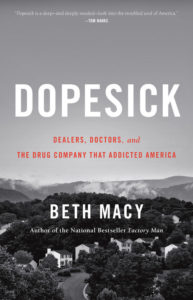 Dopesick: Dealers, Doctors, and the Drug Company That Addicted America Beth Macy (Little Brown) $28.00 This. This is one of the most amazing books of 2018 and many, many observers have insisted it is a masterpiece of groundbreaking reporting. I love this writer and trust her writing and you will be amazed at what you learn (outraged, too) by taking up even a few chapters of Dopesick.
Dopesick: Dealers, Doctors, and the Drug Company That Addicted America Beth Macy (Little Brown) $28.00 This. This is one of the most amazing books of 2018 and many, many observers have insisted it is a masterpiece of groundbreaking reporting. I love this writer and trust her writing and you will be amazed at what you learn (outraged, too) by taking up even a few chapters of Dopesick.
Beth Macy, you may recall, is the author of Factory Man: How One Furniture Maker Battled Offshoring, Stayed Local – And Helped Save an American Town a book we’ve touted often – it is such a thrilling read of narrative nonfiction, delving deep into small town intrigue and heroic, reformist sorts of business-world efforts as a furniture manufacturer tries to keep his plant open and his workers employed. Macy is a talented storyteller and excellent journalist, reporting well after doing months and months (if not years and years) of tenacious research. After Factory Man she released, in 2016, TrueVine, a brilliant true crime expose, laden with sorrow and racism and also delight and complexity and goodness. I suspect neither gets as much attention as they deserved.
Since then, she has embedded herself in the world of opiate addictions, although as one reviewer reminds us, Dopesick is “not about the drugs. It’s a book about kids and moms and neighbors and the people who try to save them. It’s about shame and stigma and desperation.” Yes, but also, it’s about bad policy, greed, and corruption.
Tony Horwitz (of Confederates in the Attic) calls it “a harrowing journey through the history and contemporary hellscape of drug addiction.” It has been compared to the most important book of this sort in recent years, Sam Quinones Dreamland: The True Tale of America’s Opiate Epidemic. (Dreamland, you should know, won the National Book Critics Circle Award.) Beth Macey’s Dopesick is equally acclaimed, winning a number of important awards. And our little shout out here.
Still, Dopesick also allows us to see the biggest picture, including the knowing corporate greed, naming both big pharma companies and notable regulatory failure. She shows the evolution of the epidemic, starting largely, as she shows it did, in the Virginia coalfields in the westernmost corner of the state to three culturally distinct communities. The story moves “from OxyContin in 1996 to other painkillers like Vicodin and Percocet to heroin, the pills’ illicit twin, and, later, even stronger synthetic analogs.”
“Heroin landed in the suburbs and cookie-cutter subdivisions near my home,” she writes, “in Roanoke in the mid-2000s. But it wasn’t widely acknowledged until a prominent jeweler and civic leader drove her addicted son to the federal prison where he would spend the next five years, for his role in a former classmate’s overdose death.”
As she covered that story she saw the overdose deaths spread north along I-81 from Roanoke. “It infected pristine farm pastures and small northern Shenandoah Valley towns, as more users, and increasingly vigilant medical and criminal justice systems, propelled the addicted onto the urban corridor from Baltimore to New York….”
BEST BOOKS ABOUT FAITH & THE ARTS
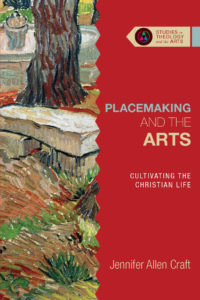 Placemaking and the Arts: Cultivating the Christian Life Jennifer Allen Craft (IVP Academic) $30.00 This is yet another in the exceptional, thoughtful, scholarly series called Studies in Theology & the Arts and we are very, very glad to honor this latest release in this series. I think when we first reported about this in BookNotes I quipped something to the affect that “just when you thought there was little else to say about the interface of faith and the arts…” Yes, indeed, this very idea deserves an award and it is beautifully, artfully, if seriously, explored.
Placemaking and the Arts: Cultivating the Christian Life Jennifer Allen Craft (IVP Academic) $30.00 This is yet another in the exceptional, thoughtful, scholarly series called Studies in Theology & the Arts and we are very, very glad to honor this latest release in this series. I think when we first reported about this in BookNotes I quipped something to the affect that “just when you thought there was little else to say about the interface of faith and the arts…” Yes, indeed, this very idea deserves an award and it is beautifully, artfully, if seriously, explored.
It is, as you can tell from the title, a study of place. I can do no better than to allow the publisher to explain this complex and yet sensible idea:
We are, each one of us, situated in a particular place. As embodied creatures, as members of local communities and churches, as people who live in a specific location in the world, we all experience the importance of place. But what role does place play in the Christian life and how might our theology of place be cultivated? In this Studies in Theology and the Arts volume, Jennifer Allen Craft argues that the arts are a significant form of placemaking in the Christian life. The arts, she contends, place us in time, space, and community in ways that encourage us to be fully and imaginatively present in a variety of contexts: the natural world, our homes, our worshiping communities, and society. In so doing, the arts call us to pay attention to the world around us and invite us to engage in responsible practices in those places. Through this practical theology of the arts, Craft shows how the arts can help us by cultivating our theological imagination, giving shape to the Christian life, and forming us more and more into the image of Christ.
To accomplish this, Craft explores the relationship of art and the natural world, of course. There’s a good section on homemaking and hospitality. Thirdly, she has a chapter on the churches role in placemaking, and using the arts to help deepen our experience of mission and place. The fourth major chapter is about society more generally. What good stuff this is, exploring the placed consequences of a robust vision of the arts.
Redeeming Transcendence in the Arts: Bearing Witness to the Triune God Jeremy Begbie (Eerdmans) $18.00
A Peculiar Orthodoxy: Reflections on Theology and the Arts Jeremy Begbie (Baker Academic) $32.00
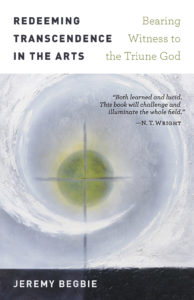
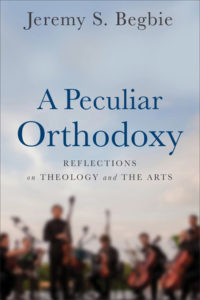
Is there a dual award for an author who puts out two remarkable, substantive books on the same field, and both seem to be utterly righteous and commendable? A lesser author might rehash previous stuff, or have one be a less academic version of another, but both of these 2018 releases are splendid, serious, major contributions towards a Christian view of aesthetics and the arts. Redeeming Transcendence is perhaps (I’m stretching here) about the arts from a theological perspective while A Peculiar Orthodoxy is perhaps more about theology, viewed through the contributions of music and the arts.
The former, published by Eerdmans in paperback, is asking if transcendence is something that we should properly speak of when talking about our experience of art. It is a live questions, with lots of implications. He uses a “Trinitarian imagination” and says yes. The endorsing blurbs include rave reviews by N.T. Wright (himself a composer), poet Christian Wiman, the justly famous abstract artist Mako Fujimura, and visual artist, collector, art historian and leader of CIVA, Sandra Bowen.
Just listen to these comments:
“Begbie’s argument here, both learned and lucid, is that only when we allow for a more explicitly biblical and Trinitarian vision of God will the vague claims for transcendence in the arts begin to make sense. This book will challenge and illuminate the whole field.” –N.T. Wright
“This book is a revelation. Jeremy Begbie has distilled much of modern theological aesthetics–and has done so with a sensitivity that is alert to the realities of a practicing artist. I feel both chastened and emboldened by his thoughts.” –Christian Wiman
“Jeremy Begbie has consistently been an essential guide for me as an artist who thinks theologically. Redeeming Transcendence in the Arts finds Jeremy at his best — full of theological wisdom and aspiration, with abundant artistic inspiration. A stellar guidebook for our complex journey of art, faith, and theology.” –Makoto Fujimura
“This book is a must-read for those at the intersection of art and theology.” –Sandra Bowden
The second one mentioned, A Peculiar Orthodoxy: Reflections on Theology and the Arts, published in hardback by Baker Academic, has a related but different concern; the endorsing blurbs do not include artists as such, but theologians, mostly — granted, exceptional ones, such as Matthew Milliner, Trevor Hart, Judith Wolfe, and Alan Jacobs.
Listen to Nicholas Wolterstorff on A Peculiar Orthodoxy:
Orthodoxy, yes, but not at all peculiar–unless it is peculiar for a person so steeped in orthodox trinitarian theology to be so richly acquainted with the arts, or peculiar for a person so richly acquainted with the arts to be so steeped in orthodox trinitarian theology. Only a person as learned and immersed as Begbie in both of these areas of human endeavor could spy the wide range of connections that he brings to light between theology and the arts, especially music, many of them connections I had never noticed, connections that I will want to think about for quite some time. Extraordinarily perceptive. And the range of reading brought into the discussion, with never-failing generosity of spirit, is amazing. This is state of the art!”
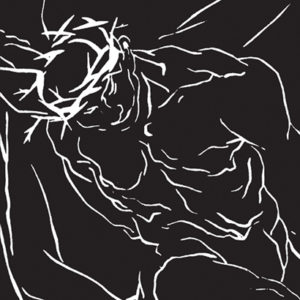 The Art of Edward Knippers: Prints and Drawings edited by James Romaine (Square Halo Books) $19.99 This latest release in the small but vital “The Art of…” series by the Lancaster-based boutique arts publisher, Square Halo, is a sight to behold, and a valuable historical artifact by one of the most important Christian painters of the last 40 years.
The Art of Edward Knippers: Prints and Drawings edited by James Romaine (Square Halo Books) $19.99 This latest release in the small but vital “The Art of…” series by the Lancaster-based boutique arts publisher, Square Halo, is a sight to behold, and a valuable historical artifact by one of the most important Christian painters of the last 40 years.
Mr. Knippers is a conservative evangelical and masterful painter, known for, among other things, vivid, lurid, violent, stunning paintings — often very large — of Biblical characters. He famously does many of them nude, mostly to show that these people are real, raw, grounded in history and creation. These are no fairy tales or myths. He resists the ethereal spirituality of Gnosticism and its related pieties with all his painterly might. There is nothing sexual about them, of course, but on occasion he is protested and his works have been damaged and defaced by fundamentalist censors who somehow find the penis of David or Jesus to be offensive. Touche, Knippers.
This book is visually striking with dozens and dozens of small pieces but, like the others in this series, includes good commentary and informed Christian criticism. This book offers a small collection of essays about the important late 20th century/21st century painter and they are excellent — even if you are unfamiliar with Mr. Knippers and his work. There is a foreword by Bruce Herman (and it is always a joy to read anything by him, retired now from teaching at Gordon College) and the major introduction by historian James Romaine. There are other pieces — “Faith and Form” is the central essay, by Chat Barlett, who studied at MICA, although the striking Steve Prince — now at Wayne State in Detroit teaching drawing and printmaking — has a fabulous short essay explaining Knippers as a printmaker and, curiously, happily, Danika Bigley (who holds a degree in Dance Performance from the Purchase Dance Conservatory in New York) has a essay entitled. To quote Romaine, “Bigley’s essay frames Knippers’ narrative treatment of the nude figure in terms of a dancer’s understanding of the body in motion.”(He continues, “She also touches on issues of sexual slavery and the freedom of marriage as seen in his art and in the Bible.) There is a closing conversation with Ed Knippers, interviewed by James Romaine as they strolled through the National Gallery of Art not long before the book came out. Overhearing part of that interview, transcribed nicely for us by Margaret Bustard, is a great privilege.
Of course, through it all we have the smaller works of Ed Knippers (not reproductions of his large paintings) and the diversity of styles and subjects makes this a sheer delight, a great little book of art. This includes many black and white drawings and etchings, prints, and one section of preliminary sketches. There is helpful explanation of these; despite the excellent, substantive text, this is still mostly a book featuring the artwork itself. It makes a fabulously interesting, inexpensive coffee table book. Kudos to Square Halo for this labor of love, adding The Art of Edward Knippers to their previously published wild paperback The Art of Guy Chase and the lavish, priceless hardback, The Art of Sandra Bowden.
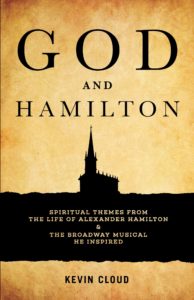 God and Hamilton: Spiritual Themes From the Life of Alexander Hamilton & The Broadway Musical He Inspired Kevin Cloud (Deep River Books) $15.99 Can we at least agree to give this book a “got there first award? It had to happen, and we couldn’t be happier to know that this book will take its place alongside many, many other studies of God in popular culture. My old housemate Bill Romanowski wrote one of the defining books on a methodology for discerning themes of faith — good or bad faith, that is — in popular entertainment and his Eyes Wide Open: Finding God in Popular Culture remains a standard in the field. (Look for his forthcoming book on film in late May 2019, by the way, to be entitled Cinematic Faith: A Christian Perspective on Movies and Meaning, published by Baker Academic; $22.99 for those that want to PRE-ORDER it.) But I digress…
God and Hamilton: Spiritual Themes From the Life of Alexander Hamilton & The Broadway Musical He Inspired Kevin Cloud (Deep River Books) $15.99 Can we at least agree to give this book a “got there first award? It had to happen, and we couldn’t be happier to know that this book will take its place alongside many, many other studies of God in popular culture. My old housemate Bill Romanowski wrote one of the defining books on a methodology for discerning themes of faith — good or bad faith, that is — in popular entertainment and his Eyes Wide Open: Finding God in Popular Culture remains a standard in the field. (Look for his forthcoming book on film in late May 2019, by the way, to be entitled Cinematic Faith: A Christian Perspective on Movies and Meaning, published by Baker Academic; $22.99 for those that want to PRE-ORDER it.) But I digress…
We are here to close up our list of (at least some of) our favorite books of 2018 and want to affirm this fine study of theological themes and enduring insights from the smash Broadway hit. It’s fun to see very thoughtful writers endorsing this — from the justice activist Phileena Heuertz to film scholar (and now President of the Seattle School of Theology) Craig Detwiler and glorious memoirists like Katie Savage (we love her book Grace in the Maybe that alerts us to seeing signs of life in daily stuff.) And there are signs of life in Hamilton and Cloud helps us explore them.
I have not see the play and am less familiar with the soundtrack than, well, 3/4 of the people I know. But when I see this evangelical leader thanking Lin-Manuel Miranda so earnestly, and read cast members offering affirmations for this thoughtful book, when solid missional pastors and thinkers I respect rave, I know this is worth celebrating.
Who knows, maybe there will be more studious and enduring books on a Christian evaluation of the Broadway phenom. There will be ongoing engagement with Ron Chernow’s biography of Hamilton, on which the play was based, and which Cloud refers to nicely. I’m sure there will be more to this on-going conversation.
For now, this is a fabulous little resource and we are happy to honor it, thanking those who are helping us think faithfully with “eyes wide open” seeing the “trailing clouds of glory” even in a hip hop musical about a long dead politician. Hip, hip hooray!
BookNotes

SPECIAL
DISCOUNT
+++
ANY BOOK MENTIONED
20% OFF
+++
order here
this takes you to the secure Hearts & Minds order form page
just tell us what you want
inquire here
if you have questions or need more information
just ask us what you want to know
Hearts & Minds 234 East Main Street Dallastown PA 17313
read@heartsandmindsbooks.com
717-246-3333
